#let's get metatextual!
Explore tagged Tumblr posts
Text

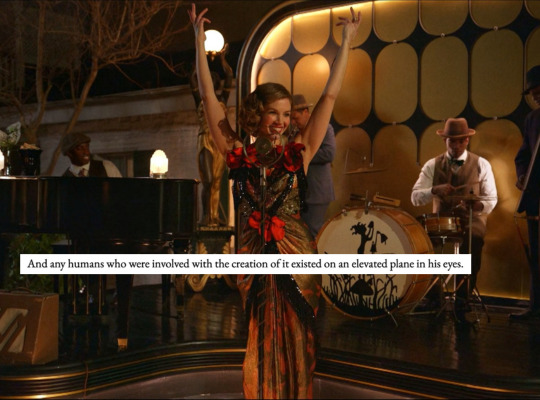

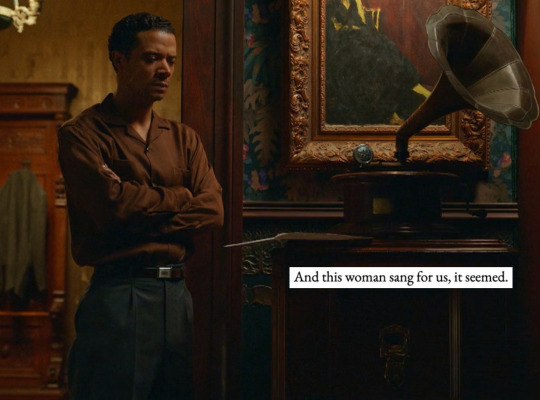
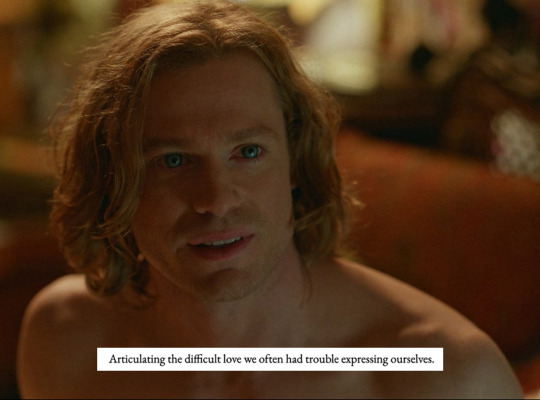

interview with the vampire: 1.02 / 1.03 / 1.06
#let's get metatextual!#I was rewatching 102 and couldn’t get this out of my head#louis on his tip toes in that last one kills me. and lestat's hand going for the waist. me too buddy#sorry if this is hard to read I made it in 25 minutes at 3am#vampterview#rewind the tape#louis de pointe du lac#loustat#iwtvedit#interview with the vampire#lestat de lioncourt#web weaving#max.png#1.02#1.03#1.06
47 notes
·
View notes
Text
there's an element to how these stories are being presented that's starting to nudge my nerve a little but I'll be quiet until the season ends
#it's a great ep i just-#it's a bit hard to let the tale seduce me when you're doing everything in your power to demean it#metatextually#i get what they're going for#but it's starting to do more harm than good for me personally#I'll interrogate my feelings on it more when i have time idk
4 notes
·
View notes
Text
Something that's stuck with me from the Arch Heart's appearance, which highlights a major underpinning of my frustration with C3, is the "Big Doors don't work" comment.
In what way exactly is the Big Door not working?
The purpose of the Divine Gate was to mitigate the gods exerting undo influence on mortal affairs, and according to everything we've seen in all 3 campaigns up to this point, this was a demonstrable success: the Calamity ended, and despite multiple potentially world-ending catastrophes cropping up since then, it has been up to mortals to deal with these threats. They've often done so with divine aid, but I fail to see how that's overreaching on the gods' part when accepting said aid is still dependent on mortal choice.*
Part of the Arch Heart's reasoning for wanting to "let go" is, as I understand it, because mortals continue to rebel against and resent the gods even from behind the Divine Gate. Which, yes they do, but like... the customer is not always right. Not every complaint needs to be catered to, especially the ones based on faulty postulates.
I get that this is not how the Arch Heart is thinking about it; my issue is not with the roleplay of individual characters, but with the narrative whole and the sheer amount of time it has spent, both in the text and extra-textual framing, sincerely entertaining the base axioms of an argument that is so poorly constructed Ludinus wouldn't make it past round one of a middle school debate club. None of the anti-god arguments have given any tangible evidence for the claim that the gods are an oppressive force or that Exandria would be better off without them that is not either:
A. Aeor, which was pre-Divine Gate and in fact the catalyst for the gods to pull back on interfering with mortal affairs, and therefore not all that pertinent to the current status quo;
or B. an event or action that, while it may be done in the name of the gods (e.g. Hearthdell) or directly encouraged by a god (e.g. Opal and the Crown) is nonetheless still contingent on mortals making choices, and therefore not a convincing argument that the gods are infringing on free will,** nor that removing them would prevent these types of situations.
An ongoing motif of C3 has been showing perspectives which challenge the prevailing narrative about the gods as established within Exandria's lore to this point. As a story enjoyer, I normally would eat up this sort of reversal—I love a metatextual play with in-universe narratives. But to do so convincingly requires more substance than a handful of characters going 'Trust me bro.' I'm going to need to see some peer-reviewed studies on Exandrian metaphysics before I take Ludinus "17 ulterior motives stacked in a wizard robe" Da'leth's word over what I've seen with my own brain over thousands of hours worth of game play.
If the message of the narrative is telling me to question the diegetic information it presents, then I am going to do just that. So far every argument that the gods do more harm than good for Exandria has been rampant citationless behavior. I find it baffling and borderline infuriating that we're approaching the denouement of this campaign and I still have yet to see evidence that the core conflict of the story, the central debate which has plagued every in-game and fandom discussion for a year now, is based on an actual problem. Like, at all.
*If you think Vax did not exercise his own agency and free will in every step of becoming Champion of the Matron, you are simply wrong.
**For real, we know there are magical means of straight-up mind control in Exandria. Like, you don't have to approve of it, but the gods engaging in standard issue verbal manipulation does not constitute a violation of free will, and it certainly doesn't make the argument that they are so immeasurably more powerful than mortals that they should not be allowed to exist.
#anyway earlier today I reblogged a shitpost that says better in 2 images what I took 3 days and ~8 paragraphs to articulate#so you should reblog that instead of this#critrole#c3#cr spoilers
243 notes
·
View notes
Note
Do you have any Jason AO3 fic recommendations? Or just DC AO3 fic recommendations in general?
Hello! Hi, yes I do.
So, of course, anything by yutro @boyfridged, first of all, such as paint it over, black out days, & leave no trace, but genuinely all of their work is incredible. They understand Jason on a fundamental level- though to say he understands only Jason that deeply would do him and his writing which is so, so skilled, a disservice :))
the clay steals the clay by zipadeea is beautiful.
I'm sure you're familiar with it, but PLUTO. by orpheusaki @damianbugs is, imo, a classic. It recalls some of the feeling of some of the best parts of Countdown for me, for obvious reasons.
all of ceramicheart's (who I'm not certain would want me linking his tumblr blog!) work also- in particular redshift, but all of that series and, like I said, I love all of her work. ultimate Kyle Rayner understander & beautiful writer.
What the Living Do, Anonymous, is one of my favourite fics, esp as someone trying to give Jason Cotard's Delusion at every possible occasion.
last word WISDOM better get some even too late by Esmenet is one of my favourite fics point-blank. the Anne Carson of it all...
Get Used to Dying, by papered_king is one I always associate with the above, stylistically also! Love the meta of this, love theatre as horror.
a second darkness by vlnlr @batphobique. This absolutely blew me away, and the script format was, personally, a major bonus. I will probably be reading this over and over again.
mushrooms at sunrise by bleepbloopskoodlebop & Amble On (and your friends will surely find you) by Nightsrk both feature Jason dealing with schizophrenia, and I am very, very fond of both.
the Emergency Line series by crucifixinhell
i am what i am by luuma.
dirt by sunspikes. It's horror to me.
Time Loop fic! Ad Infinitum; Modified by familiarities (twistsandturns)
The Cold Like Coming Home by cabezas_de_vaca.
Smashing Tail Lights by CunningCrow @redactedcrow. I have read this about 5 times. I am still (very patiently) waiting for part two. It was, I think, the fic I read directly after reading Lost Days for the first time.
Apollo by sparkypants. the horror of never letting go!!! the horror of bruce wayne specifically never letting anything go!!!
Incomplete, but which came first (the robin or the grave) by figofswords @figofswords. Two years on I'm still hoping for more but it's very good as is as well!
do you listen to the girl in red, white, and blue? by ThatSpicySeaFlapFlap. Stephanie Brown girl of all time Stephanie Brown
Trapped by lurkinglurkerwholurks. I must have read it about 15 times whenever I'm feeling anxious. Because something is wrong with me.
Song of the Insensible by Jade_green.
The Whale by chucklesbuckles if you want some very terrifying Jason, & Get Joker by them (featuring maybe one of the only Harley Quinn depictions in a fanfic I've found compelling, not that I know her well) also!
Your reflection, your bitter deception & dust in my mind by KangaRou.
Bloodstains Won't Make It Matter by skylarkblue.
This is orphaned, but The Last Laugh.
Enough by Lunette3002.
Batman Kills the Joker by DragonflyxParodies & Palimpsest by cabezas_de_vaca both take interesting metatextual approaches to killing that stupid clown.
You're No Hero to this Story, Just Another Wretched Pawn by EventualToast. The way this is written is so genuinely unmooring and perturbing; it feels very authentically like derealisation and the true experience of profound horror despite most of that being magic.
To My Brother by a_silly_gander, I’d feel less like St. Sebastian if you’d stop searching for another arrow by worthy_willow, i know (do you know?) by cuephrase, imperfections can be nice by mikkal, Where You Perfectly Stand by cherrysour, what's in your head? by sinistercacophany @sinistercacophony (also has very good aftg fics, as an andrew enjoyer I come back to their work often), . I am at heart just sentimental about Dick & Jason.
the prophetic spring by yellow_caballero @yellowocaballero. I need you to understand I barely ever approve of Reverse Robin AUs. It's a thing. I talked about it extensively. I don't even care about or actively dislike a lot of the characters this au focuses on but it doesn't even matter here, seeing as I've been a fan of this author's writing for ages. So much tragicomedy. If you, or anyone reading this ask happen to be a fan of TMA do yourselves a favour and go read their TMA work also.
Late Night Langoustining by whaleofatime. I rarely read fluff but I'm very fond of this one.
Stage Directions by confusedrambler.
I mention sparingly but arkham!jason was my first foray into DC at all- and so naturally Ill Weeds Grow Apace by LananiA3O is something I've come back to, mostly for nostalgia nowadays. And trauma of course.
So if you want to absolutely ruin your entire day and possibly week and possibly several months, Of Broken, Blazing Wings by FrEShAVocaNoob. It absolutely wrecked me, I felt genuinely unwell after, but it was worth it.
Clearly Calm and Keeping Terrorised by Batbirdies & the Make a Little Birdhouse in Your Soul series by bacondoughnut are others I think everyone knows, but I thought I'd mention them anyway.
Anyway, I'm sure it shows that I've got a bit of one-track mind when it comes to characters I read fic about, but I hope this is a good collection for you. It took me two hours in one sitting but for some reason I can't write an essay for my master's degree? Fascinating.
112 notes
·
View notes
Text
I. Introduction
A while ago, I wrote on how Jack Slash was a prime example of how Worm approaches metatextual commentary. Wildbow has a general tendency in his first two serials especially to identify common story tropes and give them in-universe justifications. Jack Slash in particular is a response to the tendency for writers to give plot armor to the Joker and similar sorts of popular villain characters. The out-of-story justification of the authors ("we can't have someone just shoot him, that's boring, besides everyone loves this guy look at him go") becomes an in-story aspect of his powers: an ability to subtly influence other capes behavior allowing him to always escape danger. Plot armor transformed into an in-universe mechanic that characters are aware of, react to, and work against.
Notably, this tendency is never used to highlight the status of wildbow's characters as characters— there is no fourth-wall breaking or attempts to undermine the audience's perception of the story as containing essentially a self-contained world running on its own internal logic. But this certainly isn't the only way you could comment on Joker-type charcter's plot armor: Funny Games covers similar ground using the opposite trick, repeatedly having its home-invader villains draw attention to how they're characters in a story, and that whether they win or lose is determined wholly by the author's will. Director Michael Haneke continually draws his audience into the story only to violently and repeatedly pull them out with suspension-of-disbelief-shattering acts on the villains part. It's The Treachery of Images as a horror movie.
Together, Worm and Funny Games showcase two different approach to explaining why the villain gets to live another day. If you can explain their deal using only the internal logic of the story ("Jack has a power that lets them escape consequences"), then the author is giving a diegetic justification for the trope justified by mechanisms of the story's universe. If you can't explain their deal without reference to them being characters in a narrative ("Paul can talk to the audience and rewind time because he's a fictional character and can do whatever the author says he can do") then its a "narrative" or nondiegetic justification for the trope.
These can be combined. Seidlinger's Anybody Home? used them together for awkward effect: serial killers perform acts that get recorded by some mysterious "camera" that produces a log of their events, which through mystical and mysterious means gets distributed to film producers and adapted into horror movies. Killers have fully "narrative" reasons for following horror tropes—they know they have an audience and are behaving for their benefit. But the story suffers from its awkward in-story justification, its "mechanical" framing: the audience the killers are acting for are other people within the story's universe, not the readers of the book. Characters realize they're "victims" in a story, but they're framed not as existing fully for the story but as normal people who got caught within a story, stuck in it like one gets caught in a storm.
In this post I want to highlight some more elegant ways of combining the mechanical and narrative approaches to metafiction, especially in regards to plot armor. I'll be commenting on wildbow's second serial Pact, Homestuck, and Eidolon DISKA, and heavily spoiling all of them. I've divided them into sections so readers can avoid spoilers or skip over works they're uninterested in, though they're not separate essays. I'd maybe recommend checking out DISKA if you haven't. Its great. Alright then.
II.
Pact and the otherverse gives its characters diagetic reasons for following tropes that align with narrative rules though its magic system. Otherverse magic largely involves telling the universe a story and hoping that your behavior has enough symbolic resonance that it believes you. A lot of the magic spells work on a "I dunno, this feels like it would work" logic.
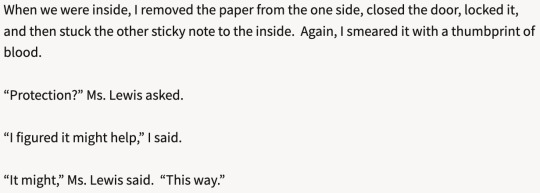
This means that characters need to be aware of how characters in good stories would act, and often need to behave in a way that is believable if they were characters in a story. The result is that Blake Thorburn ends up purposefully trying to emulate a monster from a horror story, purposefully playing into the tropes of such a character. He acts like a specific type of story character, not because he's broken the fourth wall and knows he's in a horror story, but because he knows convincing the universe that he's a horror villain will likely lead to the universe letting him survive just a little bit longer before he collapses into an exsanguinated heap.
However, Pact's approach to the specific mechanics and abilities of Blake and other monstrous entities of his ilk is much more in-line with how wildbow previously approached Jack Slash. Horror-movie style monsters are a grab-bag of entities called "Boogeymen" within the setting, with little in common outside of previously being people who had fallen through the cracks of reality and climbed out of the abyss changed.
The tropes of slasher movies are once again given mechanical justification: the monster drives conflict and acts unpredictably because being feared gives its more of a foothold in reality. It can't stay dead (and keeps returning for sequels) because it can always climb back out of the abyss again, or be summoned by Scourges to be used against their enemies. Some of the ways the in-universe boogieman mechanics reproduce these tropes are explicitly narrative justifications—they're stronger if the universe sees their ends as especially "iconic," and Blake seems to be empowered the most when he leans into character and goes on a rampage— but for the most part, you could explain their deal without having to refer to their roles as characters in a narrative.
III
The same couldn't be said for Homestuck's take on the serial-killer trope, which is explicable pretty much only in non-diagetic terms. Which is interesting insofar as its one of the only parts of Homestuck that doesn't at least provide a diagetic fig-leaf for a character following a cultural script.
Much like Pact's Otherverse, Homestuck also formalizes many narrative tropes as diagetic, in-universe mechanical laws of its setting. However, it doesn't bother giving justifications for why the setting has such mechanics. There's no equivalent to "they're like this because the magic of the abyss;" Homestuck's mechanical rules are almost more in the Funny Games vein of being inexplicable if you don't accept that they're the consequences of this being a story.
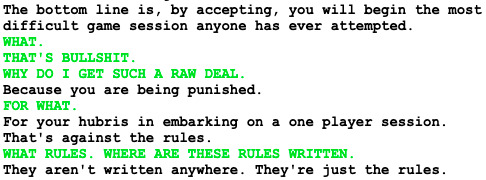
But the narrative rules it draws attention to are often all its own. See, in some ways the setting of Homestuck is meant to be an obvious set of fantasy Bildungromane. The characters enter a game world, Sburb, and are each deposited on a planet with almost stock templates: Land of Wind and Shade, Land of Heat and Clockwork, etc. Each are filled with a population of simple game constructs with little personality outside of what's needed to drop lore tidbits, and a slumbering denizen connected to a personal quest tailor-made for the player. This sense of "generic fantasy world made for a generic fantasy quest" is heightened by Homestuck's constant references to other media containing famous lands constructed from fantasy stories: Peter Pan/Hook, the Wizard of Oz, Alice in Wonderland, Don Quixote, and The Neverending Story. (That last example makes up not only a substantial amount of aesthetic references, but also structural echoes; as Homestuck copies it by having a second half in which reader-stand ins enter the story, characters go from one world to another, and the role of author and audience gets muddled in a world-threatening manner.)
It seems like the game Sburb created the players different worlds to facilitate a typical Bildungroman adventure. Enter the fantasy land, meet the locals, learn the lore, defeat the monster. Unlike Jacob's Bell, The Lands of Homestuck don't make sense as anything besides a game construct, a way to facilitate this narrative arc. And the character's tendency to sidestep the quests set up by the Lands and skip through or break things feels like a subversion of those typical sorts of fantasy stories.
A complicating factor, though, is that the game was set up with the expectation that the players would skip around and break things. The entire game is composed of a series of time loops, including the characters creating themselves, creating the big bad in an attempt to defeat him, etc. Everything that happens in a game session was engineered to happen "by" the game—including the parts that seem to break the intended narrative arc of the Lands. There's plenty of things that seem to be breaking the "intended" experience: Rose taking apart her game world, Vriska reading the mind of her Land's consorts to find out all the lore they have pre-programmed in, Jack Noir killing the Black King before the players could face him as the intended final boss. But all of these turn out to be essential conditions for the game coming to exist in the first place, for the characters to create themselves, for the Lands to be created as game constructs in the first place. The game creates conditions that require the players to "cheat."
In other words, its not just that the comic is subverting a typical fantasy story. Its that Sburb itself is a game that runs on the narrative rules. Not the narrative rules of a fantasy Bildungroman, but the narrative rules of a subversion of a fantasy Bildungroman. The subversion is expected and built-in.
This subversion-as-the-rule is something Hussie enjoys making the narrative conciet of a story: early Problem Sleuth was written with the one rule that the audience could never be right about how the main character's office worked. Its also a feature of Homestuck's general approach to characters and dialogue. I think a good example of this is Eridan and Feferi's early conversations. They get introduced as the primary examples of a form of alien romance the narrative just got done explaining, a pair of moirails that the narrator declares are "made for each other". But of course, the subversion of that is already built in, as before Eridan's full introduction we learned that he wanted to be in a different relationship with Feferi. So when the first few on-screen appearances of these characters turns out to be their break-up texts, its a "subversion" of the destined romance the narrator set-up, but its a sign-posted and expected subversion.
But back in terms of Sburb's mechanics: players of the game who perform a ritual to achieve god-tier status can only die if their death is either Heroic or Just: that is, they can only die if it’s narratively satisfying. If a powerful character dies without it being a satisfying heroic sacrifice or a satisfying end to a villainous rein of destruction—in other words, if the death is uninteresting and narratively pointless, then the character pops right back up. Like in Worm, plot armor is a mechanic of the setting that the characters can find out about and exploit, and like with Pact's boogeymen, characters become whole new types of beings as part of fitting to a character narrative that'd require plot armor. But unlike in wildbow's work, Homestuck's God Tiers have little in the way of diagetic justification. Hussie knows that there are situations where an audience won’t accept the stakes set out before them—they can tell that the bad thing can’t be allowed to happen, because if it did the plot couldn’t continue or the story would suffer, so they know the bad thing won’t happen. Accepting this, they play around with the trope by having it literally impossible for the bad thing to happen if the story would be worse for it.
But where it gets weird is how this plot-armor mechanic gets applied to Gamzee, in one of my favorite sections of Act 6. Gamzee was introduced as a joke character riffing on the juggalo evil clown subculture, who later goes on a murderous rampage for reasons that are never made fully obvious in-text. He then scuttles about the story as a figure who keeps breaking the story’s rules: both the mechanical rules of how Sburb works and the rules of storytelling generally. This ramps up a lot in Act 6, where he puts on a fake god-tier outfit and starts showing up at times and places he should not be able to be based on the established mechanics of Sburb, which up until then had been incredibly strict parameters on the story. Unlike a lot of the items that loop back in time in convoluted ways, we don’t see how Gamzee appeared on Jane’s planet, or went to the future to raise the cherubs, or all the other shit he gets up to. And we aren’t given a reason for why he’s selling blood like an RPG merchant or why he’s raising the big bad or why he’s doing anything at that point. He becomes a deus ex diabolica, a character whose not really a character at all so much as someone who sets up the obstacles in the story and has no reason for doing so besides the fact that the story wouldn’t work if he wasn’t there to set up the stakes.
One especially odd thing about him though is that even though he never actually reached God tier, he seemingly couldn't be killed.

At first this seems weird. Gamzee is breaking a core mechanical rule of Homstuck: he's immortal despite not being God-tier. But then you remember that the mechanical rule of God-tier immortality was already just a formalization of a narrative rule: a character can't die if the story isn't done with them. Homestuck is breaking its diagetic rules, but following the narrative rules they reflect.
This meta-interpretation of Gamzee's immortality is strengthened by the fact that the above conversation is taking place between Andrew Hussie and one of their characters. Furthermore, said character is a fandom stand-in who later transitions into being an author stand-in. This character (Caliborn) is the main villain of Homestuck, and has been interpreted as everything from the chains of narrative inevitability, to the interface of the webcomic itself, to Homestuck readers with an unhealthy relationship to the work, to the viler tendencies of Hussie themself present throughout the comic.
Not the only such stand-in; nearly all the villains of Homestuck assume some authorial role, as Hussie has an ongoing theme of equating the author role to being a manipulator. Thus the most heroic characters generally are reactive rather than proactive, thus Doc Scratch/Vriska/Dirk/etc all trying to author the timeline or claim causal responsibility for events while manipulating other characters, etc. But Caliborn ends up representing some more of Hussie's specific creative tendencies, and is the only character that Hussie's in-comic self has a conversation with.
Notably, this conversation has pretty much the only instance of Hussie presenting all the weird obstacles of Sburb as something they've set up as the author.
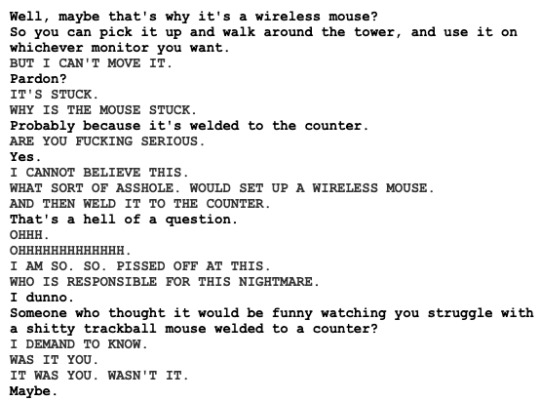
Oddly enough, apart from this, the yellow yard, and the Spades Slick sideplot, "Hussie" as a character has all but no role in the story. Which is in keeping with their (possible farcical?) ethos of all their characters existing as their own entities/character types, with Hussie just expressing them. The Entities in Worm actually end up being more direct author figures than Andrew Hussie's own self-insert, since they at least perform the role of authors (control characters in a way that produces dynamic and interesting scenarios).
This is a part of why the Hussie stand-in apparently lacks knowledge of their own story, and gets surprised by it.
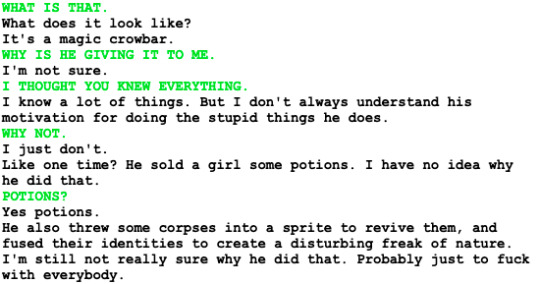

Hussie claims even they don't know where Gamzee got things, what he gets up to, or why he's doing what he's doing. The first two things are probably true, honestly. The actual author Hussie may not have an idea in mind for how Gamzee gets to any of the places he does, since its not really relevant to the story. It feels weird that he doesn't, since so much of the rest of Homestuck is tracking how various objects travel from one point in a timeline to another, but when there's no interesting answer to be constructed by the author none really has to be provided. Again, by this point Gamzee is a plot device that Hussie has dressed up as a funny clown for the audience's amusement, he's not really a character.
But if the Hussie stand-in is meant to be taken seriously when they say they don't know why Gamzee has the keys, then there's a disconnect between Hussie the character and Hussie the author. Since the keys do have a plot purpose that's revealed almost immediately, and that Hussie almost certainly had planned.
A weakness in metafiction generally is that having the author be a character in any real capacity lowers they're ability to be a true author figure. If the stand-in is surprised by something the author wrote, then they're not reflecting the author. If the characters kill the author stand-in, but the story keeps on going, then what the hell was the author representing?
IV
The only piece of metafiction I've seen that squared that circle is EIDOLON DISKA, which mostly suceeds because of its structure as an actual-play. It has a GM who serves as a narrator alongside being the voice of almost all the characters, but all the main characters are acted out by other people. So it can pull a lot of the standard metafiction moves in much more convincing ways. The narrator reveals that he's an in-universe character who they actually know, and whose been writing the story they're all in. When the player characters are still able to rebel and fight against the narrator, it works, because the PCs actually are representing other people making decisions apart from the GM. Even a character usurping the author ends up working, since it just means that character's player becomes the GM.
As you'd expect, EIDOLON DISKA is another piece that blends diagetic and narrative rules. Gods currently writing the story (aka the current GM) can't rewrite portions that previous gods wrote, because doing something so narratively unsatisfying would break their own godhood. Breaking the rules of the Eidolon rpg system also risks being usurped, since they're the narrative rules the story runs on, and the diagetic rules of Godhood are just narrative rules.
This gets most interesting when the characters end up dying, as will sometimes happen in an actual-play of a ttrpg where death is a mechanic. The podcast is divided into two time periods, with the first group being the founding members of their school's mystery solvers club. The second group are the members of the same club 20 years later, trying to solve the murder of the founders. Because the first group's death is a set event that the narrator already wrote would happen at a specific time, every time the characters in that first group die before that point, they have to come back. And once it becomes clear that they're characters, they become aware of this, and start abusing it. They take bigger risks, stop freaking out when their friends get hurt or killed in battle, start getting chatty with the increasingly annoyed grim reaper—in other words, they realize they have plot armor and start acting like it. Since they're aware of and secure of their plot armor, they use it more fully than Blake does. And since its an actual play instead of something written by one person, they're actually able to use that plot armor to be more than a villain thrown into heroes way like Jack Slash or Gamzee. DISKA isn't finished yet, but I have the most hope for it going into interesting places with plot armor out of any of these stories.
#wormblr#parahumans#homestuck#eidolon diska#eidolon playtest#wildbow#andrew hussie#Youtube#pactblr#otherverse#mals says
171 notes
·
View notes
Note
your post from yesterday about preferring Riddlers to be working class just reminded me of something that bothered me abt the one bad day issue (aside from like. everything else) and it's that OBD Riddler being from a well off fancy private school background just ..doesn't work as well? imo his 'edwardian gentleman but neon green' bit simply works better when he hasn't been raised in the dead poets society and instead leans more, well, carnival conman doing it for the aesthetic
OKAY thank you that reminded me that I need to get back to this
the Riddler is like SUCH an anomaly and an embarrassment of a character (and I say that with AFFECTION) because there's, like, no really good reason why he should have lasted long enough to become such a core Batman villain, certainly not part of a big four with Catwoman, Penguin, and the Joker. the fact that he's survived and stayed relevant so long is a HUGE fluke and now he's one of those elements that's iconic enough that people would complain if it was gone but problematic enough that writers feel like they HAVE to justify his existence.
"problematic" here doesn't mean, like, politically distasteful, just that he's. I mean. you know. he's a guy in a green leotard doing bad riddles. unlike most of Batman's most iconic villains he doesn't have any particularly well known backstory, he doesn't have any deep personal connection to the Bat, he doesn't even have any unique powers or abilities or horrific inhuman appearance he's just. he's just some fucking guy who's kind of refused to fade into obscurity an accidentally became an staple of the lore along the way.
so there's this like metatextual need to justify him as a plausible threat by styling him as a highly educated super genius. One Bad Day was an especially egregious example because King made him so damn near omnipotent that it genuinely stopped making sense, not to mention trying to make him seem scarier by trying to say the plot of the Killing Joke was actually the Riddler's idea that he just? passed off to the Joker?
like stop. doing this. stop trying to make him scary stop trying to make him serious he's just a guy. he's just a silly goofy little guy who's Like That because he sucks. I'm just. I'm tired. let him be fun.
90 notes
·
View notes
Text
The plush under Collector's bed: A totally necessary analysis, trust me
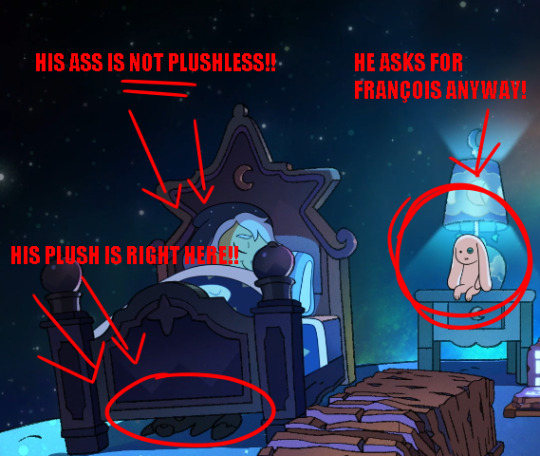
So, as a recap of this scene, before King leaves to visit Eda and Lilith, Collector asks King if he could sleep with François that night.
King reminds Collector that only himself and Luz can hold François, and Collector obliges but asks that he at least leave François there to "watch over him", claiming he "doesn't like being alone".
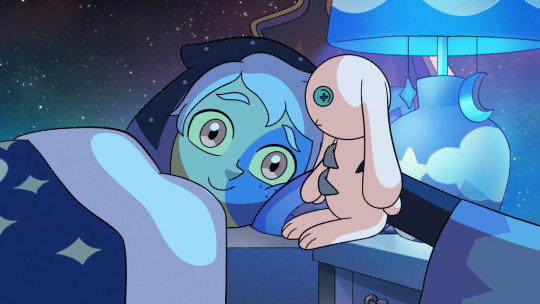
King does so, and Collector seems satisfied. It's very telling of Collector's development that they never touch François after this interaction, showing respect for King's boundaries.
... Except! This sweet little angel is actually a master trickster! A liar and a fiend!
He had a plush under his bed the whole time!!! In fact I'm pretty sure every shot of their little bedroom planet has the underside of Collector's bed obscured UNTIL King starts to leave and we pan to see the beds from an angle which reveals the plush!
You know what this means, right? Collector could have easily pulled his plush from under his bed and cuddled up with that if he hated sleeping alone so much, but he didn't. Why?
Well, I don't think he was lying about being lonely. Loneliness seems to be a prominent common theme for Collector, both declaring his loneliness back at the start of O' Titan, during a vulnerable moment where he didn't expect anyone to hear him, so he'd have no reason to lie there...
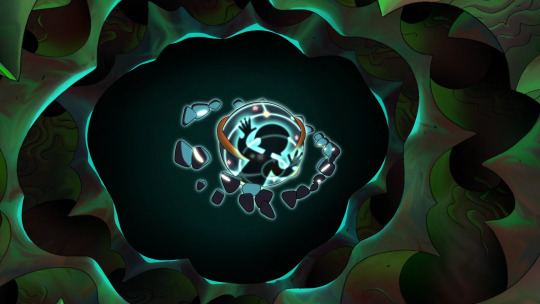
And then also having this acknowledged by King in the current episode, who has been living with him for about two months now, so he would know Collector's state of mind better than most here.

So... what gives? Was Collector really only out to force King to give François to him? Why?
Well, my current theory about this is what François means in this scenario: a connection to King. We know François is very important to King and King does not hide this when he expresses to Collector how he won't let them hold him.
To Collector, being able to sleep with François is the ultimate foolproof way to ensure King won't leave them. First, if King eventually lets them hold him, it signifies King would trust them enough with this and hold them to a regard as high as Luz, which we know Collector seems to be jealous of. I... just realized I should probably analyze that too, huh. Well, all in its due time.
And second, even if King won't allow them to hold François, but leaves them close to Collector in their room, that already acts as a guarantee. A guarantee that King will come back for François eventually, that King won't leave them to sleep alone the entire night.
Whatever the case, François is a symbol, a meter to test their closeness for Collector and King, and considering how many times Collector has lost people they considered friends before (whether those were real friends - in the case of the titan babies - or not - in the other collectors and Belos' case -) and have been double crossed by Belos, it's no wonder they have trust issues and want to make sure King does care about keeping them company.
So... that's it, then? He probably threw his original plush under the bed and then lied to King he lost it and is now constantly trying to get King to let him either hold François or at least keep him close to him as a connection between him and King?
Well... yeah, but if you'd allow me, I'd also like to talk a little on the symbology of the plush here. You see, while we can't make out the full of what the plush looks like, it appears to be some sort of canine with pointed ears and a poofy tail. Maybe it could be a titan, even a plush replica of King, but... I don't think so. There seems to be no stitching around the neck to signify it has a skull like titans do.
See, I think this is a fox plush. And why it is important in a metatextual sense that it is a fox requires a look into lots of different possibilities, each enriching the narrative in a different way.
For one, in popular folklore, foxes are seen as tricksters, lying and cheating their way into what's most convenient for them. Villain or hero, the fox is always winning people over through tricks.

This would align with the very nature of the plush being thrown under Collector's bed: it calls back to the fact he's tricking King with this. And yes, while Collector does have his problem with "fibbers", I don't think he's above more harmless tricks, we've seen him joke around with King before, purposefully feigning ignorance to mess with him, and the very nature of how he splattered Belos was through him lying that he wasn't mad. He may dislike it when a major lie is told, but little lies and sarcasm are no stranger to him.
Another possible connotation is the fact that rabbits and foxes are naturally prey and predator. François is a rabbit, Collector's plush is a fox. King, the member of the species that was hunted by the collectors, holds the prey animal, while Collector holds the predator animal...

The position of the plushes is also important here if we go with this interpretation: François is on top of King's bed, indicating he does not conceal he is the prey here and is well aware of this. He says so as much: "this whole time I was scared of making him mad". In general he behaves like a scared animal around Collector, despite their efforts to put them in equal grounds and the fact they have spent so long together and made considerable progress in their friendship.
Collector's fox on the other hand is under their bed, signifying Collector has concealed their fox, or maybe more appropriately, buried and left the fox behind. They may be part of the species that wiped out all the titans, the predators that so mercilessly hunted King's species as prey, but they want no part in this. Their backstory seems to involve wanting to play with titans and denouncing the other collectors after all, likely being bitter at them for ruining everything and hunting their new playmates to near extinction.
Alternative readings also include a few possible pop culture references. A possible one is the prominent role of the Fox in the Little Prince. While Hunter is the one who has been nicknamed "little prince" by Darius, Collector still seems more thematically similar to the character, being a child who came from space:
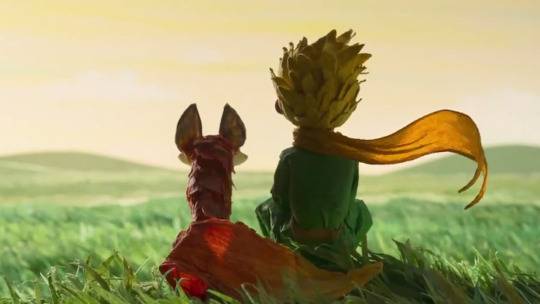
The similarity also hands itself to the fact King does somewhat resemble a fox with his canine qualities and fluffy tail, and in the story, the Fox was one of the first friends the Little Prince makes on Earth, and the one to teach him how to approach someone who does not trust you yet, to "tame" them.
Yet another possible reference this could be is the Disney movie "The Fox and the Hound":

Which seems like something I should frankly make a whole separate post comparing the eerie similarities it harbors to the current dynamic Collector and King hold. But to summarize, if you don't know the movie, it follows a hunting dog pup and a fox pup that become friends at a young age, and their friendship must overcome advertisities unique to their species.
If this is a reference to this particular movie, this once again has a different reading: Collector is clearly the hunting dog here, not the fox. For him to keep a fox under his bed would signify he wants to keep King close to him, safe under his bed and protected. This could even be a call back to the very last scene the titular fox and hound in the movie share: Copper, the hound, positions himself above the fallen Todd, the fox, protecting him. The plush being under the bed to mirror this would make sense.

Whew! I think that's everything that I had in mind to comment on this particular tiny easter egg. Whatever meaning you take from this about Collector's mysterious plush, I hope I could at least inspire something in you!
#the owl house#the collector#toh collector#king clawthorne#toh theory#toh analysis#toh spoilers#Commander's orders
2K notes
·
View notes
Text
I feel like the luckiest Our Flag Means Death fan in the world after the season 2 finale. By a series of incredible circumstances - including a significant metatextual realization that came in at the 11th hour - it was close to perfect for me.
This essay has everything. Completely normal behavior over a television series. Steven Universe references. The David Jenkins School of Whatever is Best for the Bit. Humbling catharsis.
First: this piece does not exist with the central thesis of “it’s okay to not like something but that’s not the same thing as it being bad.” I feel like thousands of words have already been written on this since Thursday, so I’m going to try to not get too in depth on that.
Second, cards on the table, because it’s relevant and I don’t want to waste your time if this is going to sour your ability to hear me out: I’m an Izzy Canyon hater. For MANY reasons, but from way before the concept of the Canyon existed, (some) Izzy fans pinged me in the same way as Snape/Kylo Ren fans did, and before May 2022 was over I went from genuinely enjoying Izzy’s character and place in the narrative to hating him because his fans made it impossible for me to enjoy him anymore.
(SOME! of his fans. Please don’t keep making me say this, although I’m not going to talk about the Canyon directly anymore after this. I know there are a ton of normal Izzy Enjoyers and even Canyonites, I am literally friends with many of them, please take this all in the good faith it’s intended and if you’re not One Of The Bad Ones then you’re fine! I very carefully don’t go anti-Izzy on main, and when I stopped enjoying his character, I stopped writing him into fics. I’m not trying to be a dick, I just want to be honest. Anyway.)
The season 2 finale made me weep over Izzy Goddamn hands.
ALL season long, I was disgruntled. All season long. I really, truly, DEEPLY appreciated what they were doing with his character and arc, I thought it was wildly on brand for the themes of community/queerness in the show, I saw the vision, I liked it!!! But. I wanted a fucking apology, yall. I needed three seconds of “sorry I called you a slur, Ed :/” and that would have been enough. But I had to let it go. It was poisoning my enjoyment of the whole season, which I loved with very little exception (not none!) and I just had to let it go. I wasn’t getting an apology. That didn’t negate what they were doing with his character.
Yall. They withheld the apology on purpose.
THIS FUCKING SHOW!!!
Let’s go back a bit. I was at the episode 6 + 7 screening, and the breakup shook me. Probably a LOT more than if I had watched it alone in bed at 3am on my laptop - five days of no sleep after NYCC, lots of emotions, seeing it on a big screen with a hundred other intense fans, etc etc - but I did see other folks reacting in parallel ways to me when the episodes aired to the regular public, so maybe I would have felt the same way. Regardless, I was mad at Stede and to a lesser extent Ed. I NEEDED AN APOLOGY FOR THAT FISH LINE. I needed it! “Whativah” autocorrects to “WHATIVAH” in my phone. I was going through it.
(When I rewatched the episode when it aired it was not nearly as bad as I remember, lol)
So now the episode 8 screeners go out and the reviews drop and I think I catch one half-glimpse of a “What a heartbreaking ending!” kind of snippet, and some of my friends who are spoiler fiends unintentionally drop little hints about similar ideas (devastating/heartbreaking/split the fandom) type shit.
And I was a fucking WRECK! about it.
I do love this whole show with my whole chest. I do!!! But I’m not rotted because this is an excellent television show, I’m rotted because two old men kiss each other! On the MOUTH!!! in an excellent television show. You get it, right? I’ve written 700,000 words across almost 100 fics and 98% of them are dedicated to those two men falling in love in different universes.
So it just did not even occur to me the “heartbreak/devastation/fandom split” would be about anything but Gentlebeard.
Another piece of this that was fucking me up - David Jenkins and his “satisfactory” ending biz. My brain was reacting like this show was ENDING ending, even if I knew logically! that this is just season 2!!! And I wasn’t ready for that, because what if it wasn’t personally satisfying, and I’m a mess about it? Why was I so worried about not liking it? I’d liked the whole season! Even if they didn’t nail the landing I wasn’t going to stop writing fic or hanging out with my pirate community & friends.
…is what I kept trying to tell myself, but the way anxiety disorders work is funny like that lol. What if I did stop writing fic and hanging out in pirate spaces? That would hurt much more than a show I like disappointing me. And for anyone who’s having that experience with ofmd s2, I’m so very, very sorry. It sucks and that’s where my epiphany came from on Wednesday before the finale.
Because it has happened to me before.
I flit from hyperfocus to hyperfocus, as ya do when you’re spicy, but the last thing to get its hooks in me PROPERLY like pirates was Steven Universe. And I did NOT like the way the regular season ended!!! (I actually really did like most of Future; that’s not what I mean. I mean season 5). I don’t like how they handled the Diamonds, tldr; I think the scope of their villainy got too out of hand, and I was left grieving the thing that had meant enough to me I ran a fan convention for four years based around it.
Side note: imagine if I had channeled the hyperfocus of almost a million words of fanfiction into an American OFMD con instead. We could have made magic :( I did consult with Our Con Means Death though so I am at least a teeny tiny bit of that one!
I did not like the way Steven ended… but I do respect the story they were telling and think they told it well.
I’m still sad about it. Steven is still one of my most beloved, it will always be beautiful and great to me, but that experience did and does sully my memories. There is so, so, so, SO much more good than bad from being in that fandom, and I cherish it. And I hope, if you’re having this experience with OFMD right now, that you’ll find similar comfort.
But, like I said at the top, “it’s okay to not like something but that’s not the same thing as it being bad” has been belabored already by people better at writing about it than me. I just had the incredible privilege to remember my brush with lower case T trauma and having that experience in my last REALLY big deal fandom. That’s why I had been so extra anxious about being disappointed. Because it happened to me before. It helped so much to connect those two.
So the finale happens, and it’s actually about twelve hours of me going from “eh, rushed but fun, whole season was great” to “THIS MAYBE IS THE BEST SHOW OF ALL TIME, ACTUALLY!”
BECAUSE THIS SHOW MADE ME CRY OVER IZZY FUCKING HANDS!!!!
They literally told me this was the story they were telling this season. “Men can change” “The end of piracy” “Ed leaving Blackbeard behind (ish).”
As for me? I didn’t get an apology for the fish. Instead, I got “Sorry I was a dick.” “You weren’t a dick. Life’s a dick.”
Just… fuckity BAM. THREE FUCKING SENTENCES resolving that fight. Saying so much in so little.
In real life, should these two men have an actual conversation about this shit? Sure!!! But that’s not how OFMD tells its stories!
It works in symbolism. It works in vibes. It works in an hour’s worth of content into each half-hour episode, and for how much lamenting I have done about the pacing, I would prefer that 100x to having to stretch it out too much.
I have said since March 24, 2022 that OFMD wields anachronism as a weapon. First and foremost, it’s fucking funny, but in addition to that, it’s stating clearly: “This is a fantasy world. This is not real history. This show is about romance (and so much more than that), and the rest is just VIBES!!!”
Sometimes vibes can be historical accuracy. Sometimes vibes can be true emotional poignancy. Sometimes vibes can be Ed finding his sunken leathers in the sea, changing underwater somehow, and coming out of the ocean like the Birth of Fucking Venus, because water and rebirth and mermaids and shit is all very prominent this season. And ALSO, and this is very important! BECAUSE IT LOOKS FUCKING COOL!
I don’t want to do much real Izzy meta here. It’s been said by others, and better than me. But it was telegraphed and it was symbolic – he was the paragon of Traditional Piracy in season 1, for goodness’ sake, and Traditional Piracy is Toxic Masculinity, and he was a part of Blackbeard and Ed had to leave Blackbeard behind (yknow, ish), and he got this ABSOLUTLEY FUCKING LOVELY! storyline about appreciating what a (queer) community can do, and god fucking shit fucking dammit… most of all, best of all (for me), was Buttons landing on Izzy’s grave at the end. Men can change. And Izzy DID!!! He did it for Ed. For love. For community. I am puzzled by “it’s fucked up to use Izzy to further Ed’s storyline” because… this was Ed’s season, in the way that season 1 was Stede’s. And Ed cannot be removed from piracy as a whole (neither can Stede!) so to have this old, set in his ways, coded-queerphobic character blossom to the point he can give this gift to Ed and to piracy… idk man. I just find it so fucking beautiful.
It is okay not to like what they did. It’s okay!!! It’s okay, and it’s okay to mourn, and while it’s not okay to do [insert vile behavior here], it’s okay to carefully examine what you think is “bad writing” vs “what you would have preferred to happen” and give good-faith, textually-based criticism on that.
But I want to remind you over and over and over again, this show works on vibes. It tells its stories leaving many, many, many gaps. There are many things I would have liked to see, and y’know what? I would have told the Izzy story differently. I would have personally done it differently. But it’s not my show! It’s not my show, and I am humbled and delighted to remember that, and to appreciate Our Flag Means Death for what it is and not what it isn’t.
Other words have been written better than I could about the 18 months between seasons 1 and 2 and what that does to us as rabid fans with expectations of how things will go. Millions and millions and millions of words have been written about OFMD, fictional and non, and that is going to color our expectations and experience. We had built it up SO MUCH in our minds and along the way I think some of us forgot (INCLUDING ME!!!) that it is first and foremost about Vibes.
The vibes of Izzy’s death are about rebirth and forgiveness and leaving traditional piracy behind. And he got to die in Ed’s arms, knowing (HAPPILY!) that he had been wrong, and giving Ed the gift of letting him know he is loved, and being a part of something. We had a funeral but we also had a wedding. The only constant is change. Men, piracy, Blackbeard; it all changes. And Izzy found peace in that.
Before my last point, I want to @ myself on things I felt versus realizing in the end it is (I will say it until I’m blue in the face) about vibes.
· I was convinced they left Buttons’ transformation ambiguous because they wanted to leave room for it not having been real. NO!!! It is real, until they decided it isn’t. Magic in the OFMD universe? Fucking why not!!! IT’S SYMBOLIC!!! IT’S IMPORTANT TO ED’S STORYLINE AND THE CENTRAL THESES OF THE SHOW!
· I was unhappy, and still am a little, about the Polycule Situation, but now that I realize Oluwande is Zheng’s Stede… I am less so. The Zheng : Auntie :: Ed : Izzy vibes, btw? Fuckin immaculate.
· Obviously they touched on Stede/Ed’s “killing people trauma” but I’d reallyyyy like Stede to address it, and even though I think Ed’s is left on a very satisfying note, I’d like him to dip a bit more into it as well. But if they don’t, oh well! It’s not like they ignored it, they just didn’t have a Deep Dive like I Wanted Them To!
· They didn’t deal with Ed throwing Stede’s shit away. They just ignored it! Stede started to collect new trinkets, and I believe that was as much about giving the audience back the old feeling of the Revenge as it was anything important (not to say it wasn’t also important thematically!!!). Just like Ed going back to his leathers is both Extremely Important thematically and about putting Taika back in the leathers because that’s what Blackbeard should be wearing for the epic final scenes for the sake of visually keeping the show consistent. That’s Blackbeard’s uniform.
· Stede’s frilly little outfits my beloved. God I hope they give him back some of his frippery in season 3. I think they will re: cursed suit BUT his journey this season was about something else, so!
· Ed’s stupid little non-profit non-apology, oh my god. It was so funny. And there is a transition from eps 5 to 6 where Ed is back in his leathers and the crew is more comfortable around him. They didn’t have to have him do a Real Apology, it’s implied it was all settled. What was the timeline? A day? DOESN’T MATTER, BABY, VIBES!!!
· Lots more, I’m sure, but now that I’ve tried to let it all go, I’m remembering less of what I wanted and appreciating what I got!
And, last point here, I think it is also very very very important to remember that a lot of people are normal about this show. In fact, WAY more people are normal about this show than aren’t. And that is EXTREMELY! IMPORTANT!!! because otherwise it wouldn’t be profitable and we all know what would happen then. We are the core of it, to be sure. Without word of mouth that stems from our intensity, this show would not be NEARLY as successful as it is. I truly, truly believe that.
But.
Do normies need deeply emotional discussions dissecting the central relationships? No. What normies need is Ed and Stede running dramatically toward each other on the beach and kissing. And I am happy, so fucking happy, to realize that’s what I need too. I’ve got fanworks for the rest.
I love this fucking show and this fucking fandom and its fucking creators so much. Fuck.
314 notes
·
View notes
Note
The Maker, for the hero-ify meme? [distinct from either his past or mainline self]
The plot of Deadpool Kills the Marvel Universe played seriously. In the wake of Ultimatum and a few other events, he becomes in some way cognizant of the metatextual baggage that his universe in particular seems to be suffering from- the kind of baggage that would let half the superhuman community get wiped out in a single ill-conceived crisis event written by a guy who was going through something. The kind of baggage that lets him nearly get eaten by his own undead doppleganger as a gag. The kind of baggage where his every inadequacy and shortcoming in comparison to the quote-unquote "real one" is just something introduced to keep him distinct enough as a character to bother keeping around at all. He becomes aware that he exists in a conceit-based-multiverse, and that 1610's conceit is that it's the one where everyone is expendable.
Rebranding himself as "The Maker" is something he does in response to this- a drastic enough departure from his template that he'll survive and gain genre-standard publication immortality when whatever's guiding the course of his universe loses interest and comes back to slaughter the named characters they missed on the first pass. His reinvention isn't as brutal or as murderous as it was in canon- he settles for 60% utopia rather than all the slaughter he'd have to enact to achieve 100%- but quite a bit of his approach is informed by a sincere belief that the Ultimate Universe is fundamentally metaphysically doomed, and that the only way anybody left in it is going to be able to survive is by differentiating themselves the way he did. He's unable to convince the rest of the FF of this, or anybody else- his new outlook reads like a total psychotic break. His long-term plan, and his version of the New Ultimate Universe project, is to try and jump ship with his (possibly abducted) friends and family to a hand-curated garden universe with a conceit that lands in a sweet spot where it's compelling enough to be allowed to exist but not so compelling that they'll actively fall back under The Eye and all start getting slaughtered again to shake things up.
35 notes
·
View notes
Text
Demon Lord, Orcus

Image © TSR Inc, by Todd Lockwood.
[Sponsored by @tar-baphon. Orcus is one of the iconic D&D villains, and through the SRD and plausible deniability (he's a Roman god!), he's in Pathfinder as well. In Pathfinder, he is deliberately not a power player, and my flavor text takes that already metatextual decision and runs hog wild with it.
A note on the art: I feel like Orcus is emblematic of when D&D was seen as dangerous, and this piece absolutely feels like it should be the cover of a Black Sabbath album. It's no surprise that I was fascinated with the anti-D&D strain of the Satanic Panic when I was a kid. Also, although there has been some course correction in the 5e era, there's a trend with Orcus in a lot of art, including his official Pathfinder depiction, of making Orcus buff. Let Orcus be fat!]
Demon Lord, Orcus CR 28 CE Outsider (extraplanar) This humanoid is a corpulent giant with skin mottled like a decaying corpse. He has great black bat-wings growing from his shoulders, hooves for feet, and the head of a goat. He clutches a short staff, tipped with an oversized human skull.
Orcus, Prince of Undeath CE male demon lord of death, necromancy and wrath Domains Chaos, Death, Evil, Magic Subdomains Demon, Divine, Murder, Undead Favored Weapon heavy mace Unholy Symbol a goat’s head with curving horns Worshipers liches, necromancers, sapient undead Minions boneclaws, deathdrinkers, demons, other undead For information on his Obedience and boons for his worshipers, see Book of the Damned
Orcus is one of the most powerful demon lords in the Universe. But not on Golarion. On that world, his is one of a number of undead cults, and not nearly the most popular. Orcus has a clear hierarchy to what undead he considers truly worthy, with those created from contagion seen as inferior to accident, and those inferior to those who intentionally seek out undeath. His most dedicated worshippers on Golarion are liches, some of whom have learned the secret of crafting a phylactery by teasing apart the Prince of Undeath’s wisdom from his threats. The followers of many other undead-focused religions, particularly vampires and ghouls, see Orcus as pretentious and unworthy of dedication, although few are foolish enough to directly oppose him.
Orcus himself knows that his star has fallen. In his extensive research into planar lore, Orcus has learned that he was once the most feared being in another universe, who went on a killing spree that left several gods dead and an entire race of lawful outsiders duped into being his pawns. That Orcus cannot accomplish this level of power in this version of reality vexes and frustrates him, and he takes his rage out on his minions as much as he does his foes.
Orcus is a genius tactician, although his temper sometimes gets the better of him. He enjoys combat as a distraction from his cosmic-level sulk, and as a way of expressing his power over others. He typically opens combat with a time stop to summon allies and cast defensive spells on himself, and then unleashes a potent death effect as soon as the duration expires. Against creatures that can resist his negative energy and poison, he uses dispelling magic. On more than one occasion, Orcus has beaten a cocky archmage to a pulp by centering an antimagic field on himself and wading into combat.
Orcus in the Great Game Orcus’ response to the brewing theomachy between Mormo and Lamashtu is cautious optimism. He desires more power in the Abyss, and Lamashtu could open the door for him to seize it. Kabriri and Zura are at the top of Orcus’ hit list, but views a direct assault on them as currently too risky to be worth the effort. If one of them were to make a move against Lamashtu and be punished for it, or if they were struck down in the scramble for power following Lamashtu’s (theoretical) demotion or demise, Orcus would happily swoop in to finish them off. And if Mormo is capable of legitimately slaying a god, Orcus will be very keen to study her techniques.
Wand of Orcus (major artifact) The Wand of Orcus is the Prince of Undeath’s scepter of office, and it never leaves his side. Lesser versions have appeared in the Material Plane, often created by Orcus or one of his high-level clerics. The real Wand of Orcus is a Huge +5 anarchic, unholy heavy mace. In the hands of a demon, it grants a +4 profane bonus to Armor Class. The first time the Wand of Orcus strikes a living creature in a round, that creature is subject to a slay living spell (DC 30). Weight 24 lbs.; CL 25th
Demon Lord, Orcus CR 28 XP 4,915,200 CE Huge outsider (chaos, demon, evil, extraplanar) Init +11; Senses arcane sight, darkvision 120 ft., detect good, detect law, Perception +48, true seeing Aura frightful presence (120 ft., DC 36), undead obedience (120 ft., Will DC 36), unholy (DC 28)
Defense AC 47, touch 23, flat-footed 40(-2 size, +7 Dex, +4 deflection, +4 profane, +24 natural) hp 709(33d10+528); regeneration 30 (deific or mythic) Fort +31, Ref +29, Will +34 DR 20/cold iron, epic and good; Immune ability damage, ability drain, charm, compulsion, death effects, electricity, energy drain, petrification and poison; Resist acid 30, cold 30, fire 30; SR 39 Defensive Abilities Abyssal resurrection, freedom of movement, negative energy affinity
Offense Speed 40 ft., fly 60 ft. (average) Melee Wand of Orcus +51/+46/+41/+36 (3d6+20 plus 2d6 chaos and 2d6 evil/19-20), claw +44 (1d8+7), sting (2d4+7 plus poison), gore (2d6+7) or 2 claws +46 (1d8+15), sting +46 (2d4+15 plus poison), gore +46 (2d6+15) Space 15 ft.; Reach 15 ft. Special Attacks epic spellcasting, powerful charge (gore, 4d6+22) Spell-like Abilities CL 28th, concentration +38 (+42 casting defensively) Constant—arcane sight, detect good, detect law, freedom of movement, true seeing, unholy aura (DC 28, self only) At will—animate dead*, astral projection, blasphemy* (DC 27), circle of death* (DC 28), create undead, enervation*, greater dispel magic, greater teleport, plane shift* (DC 25), telekinesis* (DC 25), unholy blight* (DC 24) 3/day—control undead (DC 29), create greater undead, energy drain (DC 31), finger of death* (DC 29), quickened greater dispel magic, quickened harm*, summon demons or undead, symbol of death (DC 30) 1/day—power word kill*, time stop*, true resurrection, wail of the banshee (DC 31) * Orcus can use the mythic version of this spell-like ability in his domain Spells Prepared CL 20th, concentration +32 (+36 casting defensively) 9th—energy drain (DC 33), etherealness, mage’s disjunction* (D, DC 31), overwhelming presence (DC 31), soul bind (DC 33), wail of the banshee (DC 33) 8th —cloak of chaos (DC 30), fire storm* (DC 30), greater spell immunity, horrid wilting (DC 32), orb of the void* (DC 32), protection from spells (D), unholy aura (DC 30) 7th —control weather, destruction (DC 31), greater scrying (DC 29, x2), repulsion, spell turning (D), waves of exhaustion 6th —antilife shell, antimagic field (D), banshee blast (DC 30), blade barrier* (DC 28), geas/quest, harm* (DC 30), mass bull’s strength 5th —dispel good (DC 27), flame strike (DC 27), greater command (DC 27), mass ghostbane dirge (DC 27), righteous might, suffocation (D, DC 29), vampiric shadow shield 4th —contagion (DC 28), death ward (D), divine power (x2), rest eternal, sending (x2)*, tongues 3rd —bestow curse (x2, DC 27), prayer*, protection from energy, rage (D, DC 25), ray of exhaustion, vampiric touch*, water breathing 2nd —bear’s endurance (x2), death knell (D, DC 26), desecrate, owl’s wisdom (x2), resist energy, spiritual weapon* 1st —bane (DC 25), divine favor (x2), entropic shield, identify (D), ray of enfeeblement* (DC 25), sanctuary (DC 23), shield of faith* 0th—bleed (DC 24), detect magic, light, read magic *—Orcus may use the mythic version of this spell in his Abyssal domain
Statistics Str 40, Dex 25, Con 42, Int 30, Wis 35, Cha 31 Base Atk +33; CMB +50; CMD 71 Feats Combat Casting, Combat Reflexes, Craft Magic Arms and Armor, Craft Rod, Craft Wondrous Item, Flyby Attack, Greater Spell Focus (necromancy), Greater Spell Penetration, Improved Critical (heavy mace), Improved Initiative, Hover, Multiattack, Mythic Spell Lore (B), Power Attack, Quicken SLA (greater dispel magic, harm), Spell Focus (necromancy), Spell Penetration Skills Bluff +46, Craft (alchemy, weaponsmithing) +46, Fly +36, Intimidate +43, Knowledge (arcana, planes, religion) +46, Knowledge (dungeoneering, history) +43, Perception +48, Sense Motive +48, Spellcraft +46, Stealth +35, Survival +45, Use Magic Device +46 Languages Abyssal, Common, Draconic, Infernal, Necril, telepathy 300 ft. SQ demon lord traits, master of death
Ecology Environment any land or underground (Abyss) Organization unique Treasure triple standard (Wand of Orcus, other treasure)
Special Abilities Aura of Undead Obedience (Su) Any undead creature within 120 feet that attempts to make a hostile action against Orcus must succeed a DC 36 Will save or be unable to take that action, wasting it. The save DC is Charisma based. Epic Spellcasting (Ex) Orcus gains Mythic Spell Lore as a bonus feat. Once per day, he can use one of his spell-like abilities or spells as if it was a mythic spell without spending a use of mythic power. This allows him to use a mythic spell or spell-like ability outside of his Abyssal domain, but he cannot augment that spell or spell-like ability by spending additional uses of mythic power. Master of Death (Ex) Orcus applies his Spell Focus and Greater Spell Focus (necromancy) feats to his spell-like abilities. Death effects created by Orcus, including the Wand of Orcus in his hands, ignore immunity to death effects except for those granted by creature type, or from deific or mythic sources. Poison (Ex) Sting—injury; save Fort DC 42; duration 1/round for 4 rounds; damage 1d6 Str and 1d6 Con; cure 2 consecutive saves. A creature reduced to 0 Str by Orcus’ poison cannot breathe and begins to suffocate. The save DC is Constitution based. Spells Orcus can cast spells as a 20th level cleric, and can prepare necromancy spells from the sorcerer/wizard list as if they were cleric spells. He gets access to domain slots, and can fill them with spells from any of his domains or subdomains. He can also spontaneously cast inflict spells as an evil cleric can. Summon Demons and Undead (Sp) When Orcus summons demons, he can also summon undead creatures.
#orcus#demon#demon lord#pathfinder rpg#pathfinder 1e#D&D#satanic panic#todd lockwood#undead#outsider#necromancer#sponsored post#demigod
116 notes
·
View notes
Text
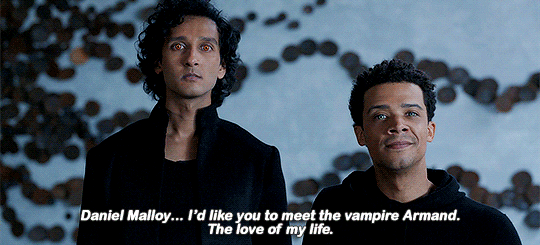
Gif courtesy of @apaethy
I just finished re-watching the first season of Interview with the Vampire because in light of what's going on as of 2.6 of S2, I felt I needed to, because this moment above is driving me crazy.
Why is Armand staring straight at Daniel during Louis' declaration? And why is it that, to me, he almost seems to plead with his eyes for Daniel to get him away from Louis?
My thoughts on the matter:
Doylist reasons (aka, out of universe, production, practical reasons): this is a big reveal that "Rashid" is actually Armand. It makes sense, from that angle, as an acting choice that Armand-no-longer-Rashid would look straight at the camera so we could get a good look at him.
Thing is, it's certainly a choice.
Because I would argue the more logical choice when having one character declare the other is the love of their life is for those characters to look at each other. Even a passing glance, a faint smile, a little bit of heart eyes.
Louis just gave a pretty romantic declaration. Actually, even more haunting as of 2.6, Louis just said out loud that he loves Armand in this straightforward, unambiguous, but frighteningly passive way that he refused to do back in Paris, what Madeleine had to cajole him into saying. Now Louis drops the L word all casual, almost as a challenge, right in Daniel's face??
Daniel Molloy voice: Nuh uh, I don't buy it, not for a second.
Ok, let's get into a meta reason this is a really freakin' weird moment and scene that they chose to use as the final note of Season 1, and therefore I think it's meant to be important and, as of Season 2, I think we're seeing the crux of why it's the end of one season and the set up of the next.
Metatextual reason: Armand is not the fucking love of Louis's life in the books. He's barely a footnote, unless that footnote is labeled, "THE VAMPIRE WHO KILLED CLAUDIA". Louis and Armand's relationship, such as it was, soured immediately after her death. They didn't stick together for decades, from the text they barely stuck together a few years after that. Armand wasn't at the Interview with Daniel (but he did pick up Daniel later, when kidnapping him when Daniel went to investigate Lestat's house and look for evidence to corroborate Louis' story).
So as a book fan, I sat up in my chair and audibly shouted, "What the fuck?" at that line. Because as I'm sure anyone who has read this far knows by now, in the books Louis is not the love of Armand's life.
Daniel is the love of Armand's life.
Daniel is Armand's only fledgling, ever.
So not only is there a weird declarative quality to the almost nonsensical (to book readers) statement that Armand is the love of Louis's life-- I don't know how else to explain it except it's like having a revival of Romeo and Juliet where they didn't die and Romeo's early girlfriend Rosaline show up to say that Romeo is the love of her life in Juliet's face. Do you see what I mean? Daniel/Armand is Romeo and Juliet, Louis the temporary fling. Having Rosaline tell Juliet that Romeo is her love would give a similar level of dissonance as I got hearing Louis/Armand was a thing over and above Daniel/Armand.
So to go back to Armand's creepy eye contact here (as if he has any other kind).
Watsonian Reason (aka, in-universe, what the story is going for): We are setting up the plot that becomes much more apparent in S2: Daniel was invited to Dubai to be the wrecking ball in Louis/Armand's relationship.
Which means the big canon divergence moments from the book are:
1. Louis and Armand didn't break up right after Paris, but stayed a couple for several decades longer.
2. Regardless of whether or not the Devil's Minion happened already (or if it's going to happen later in this story), Armand didn't turn Daniel into a vampire soon after meeting him a few years post-Interview with the Vampire. That event got pushed back.
My money is on Armand and Daniel had their fling but Armand refused to turn him. It's a fairly logical canon divergence beat because Armand didn't want to turn Daniel in the books either so in this universe, he just actually followed through and did the responsible thing.
But, I think Armand pined. And pined. And pined.
Whether or not Armand is Alice turning down Daniel's proposal (I at this point disagree with the theory) or if he was just stalking Daniel closely enough to read Alice's thoughts in that moment, he clearly has been keeping tabs on Daniel.
In my opinion, Armand is finally done with the relationship with Louis.
The interview is meant to passively accomplish these things:
Remind Louis how much he loves Lestat.
Remind Louis how much he loves Claudia and by extension if/when it "slips out" just how culpable Armand actually was (as the mastermind, not a bystander) for her death, it will give Louis the impetus to finally leave.
Bring Daniel back into their life. Because whether or not he'll admit it to himself, Armand has been pining for him over Louis for a while now.
I've kind of already explored this in another post but the more I watch of S2 and re-watch of S1, the more certain I am that this is Armand's actual goal. The pining looks he keeps shooting Daniel's way, the way Daniel seems to lose his train of thought whenever he looks at Armand, the palpable tension between them...
Basically, Romeo and Juliet are getting back together soon. We just need to get Rosaline out of the picture first, and that's why Romeo is having an interview that digs up what a shitty boyfriend he was to Rosaline so that Rosaline will break up with him first so he can get back with Juliet.
#iwtv#iwtv spoilers#iwtv meta#loumand#the devil's minion#daniel molloy#I've kinda explored all this in another meta but I can't get these thoughts out of my head#so forgive me as a repeat myself#vampire chronicles
52 notes
·
View notes
Text
An essay about Barbara Gordon: Part One.
@mrsbertinelli
@spoilerqlert
(Hoping this is good.)
We're bringing in a favourite, folks, Say hello to Barbara Gordon.
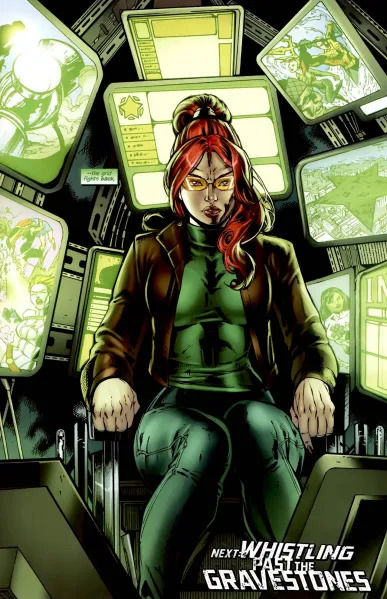
In today's essay, we’re (hopefully) going to discuss coping, catharsis, responding to meta-textual misogyny and damn good art.
PART ONE UNDER THE CUT.
My essay begins with Oracle: Year One: Born of Hope. Following after The Killing Joke, focusing on Barbara’s mental state as she goes from depression to beginning to build herself up.
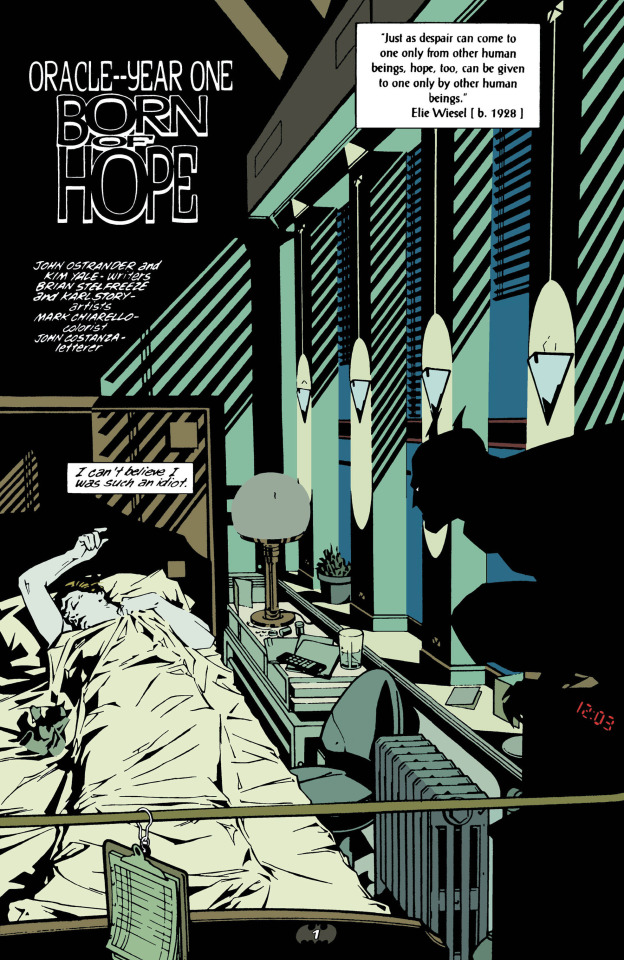

And Barbara, predictably, is angry. Most of all at herself, because she “should have known better.” Should have looked through the door hole, should’ve knocked the gun out of his hands, should have done… anything.
But none of it is her fault, how was she supposed to know that someone, especially someone like The Joker, would show up in broad daylight to abduct her father? How was she, having retired being Batgirl, supposed to have predicted anything from That Life would come to her?
The blame for everything is on Joker, and she knows that, but she still feels raw. She feels like an idiot, a disappointment.
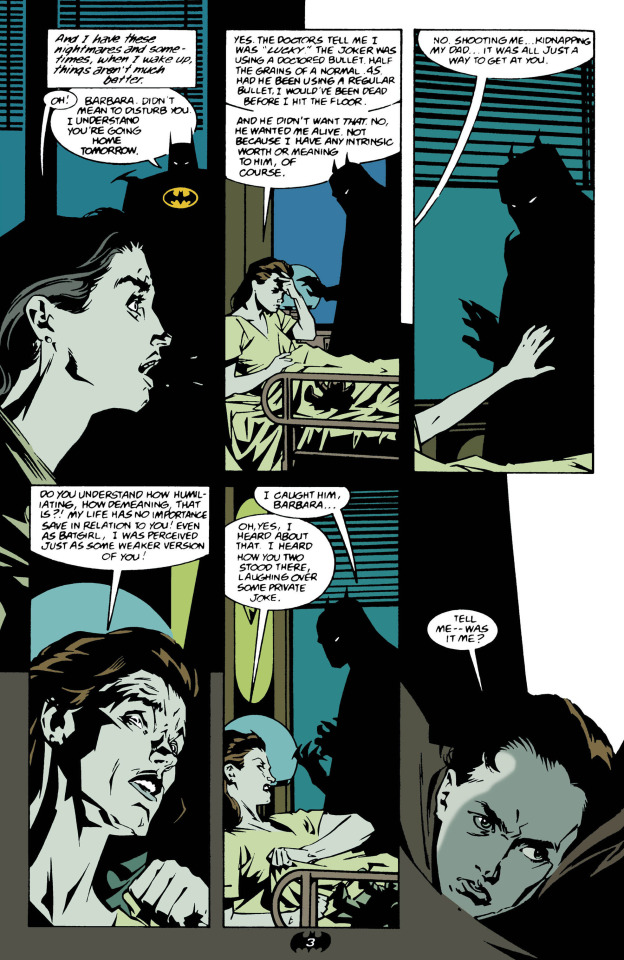
”Good. I hope I’ve hurt him. It’s nothing compared to the pain I’ve felt, or will feel.”
Barbara’s lashing out is completely understandable, imagine having a normal day, and then everything changes and it wasn’t even to hurt you. it was to hurt your dad, and then one of his friends. Never about you, no, no, you were just a convenient way to hurt the real target.
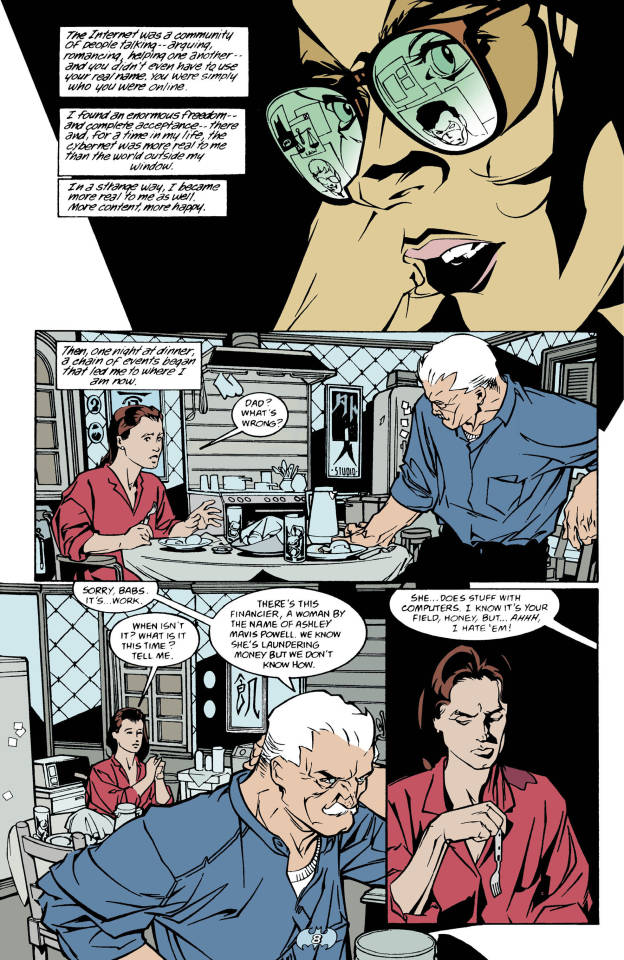
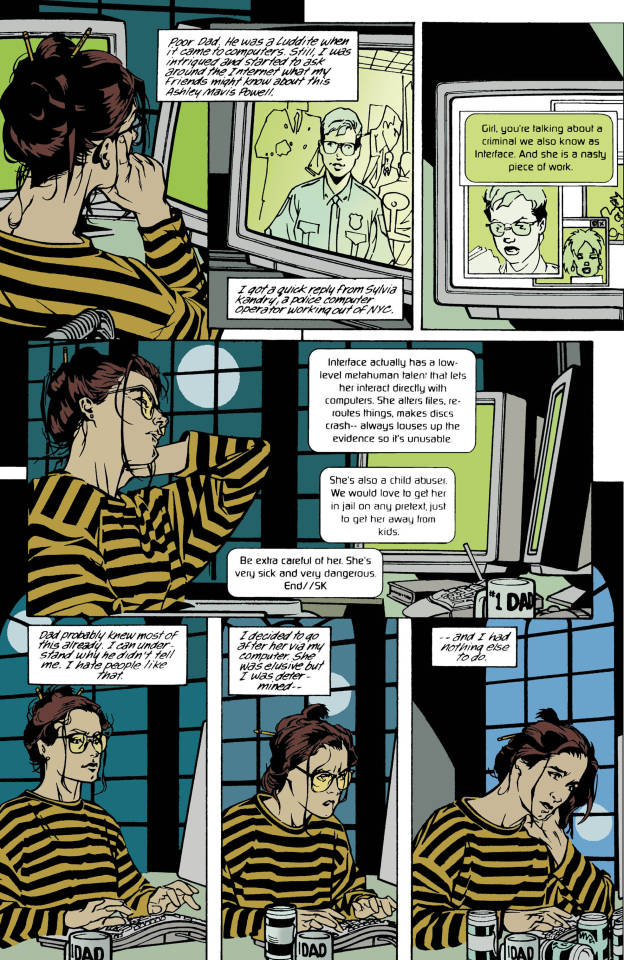
After a few pages, Barbara starts trying to use her skills to do something, feeling “tired of being a victim.”
But, despite her efforts, the person she’s investigating finds her and…
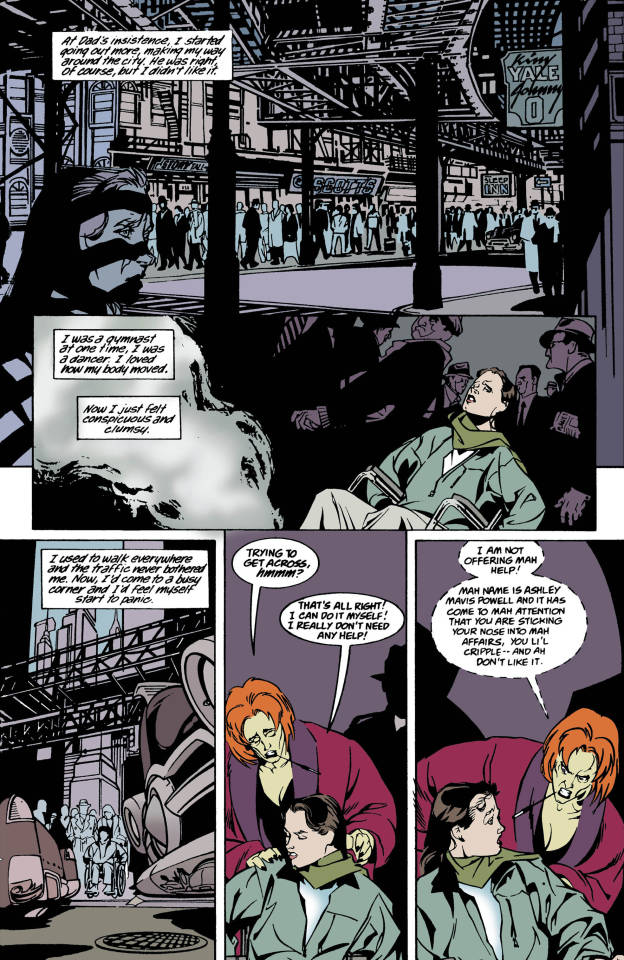
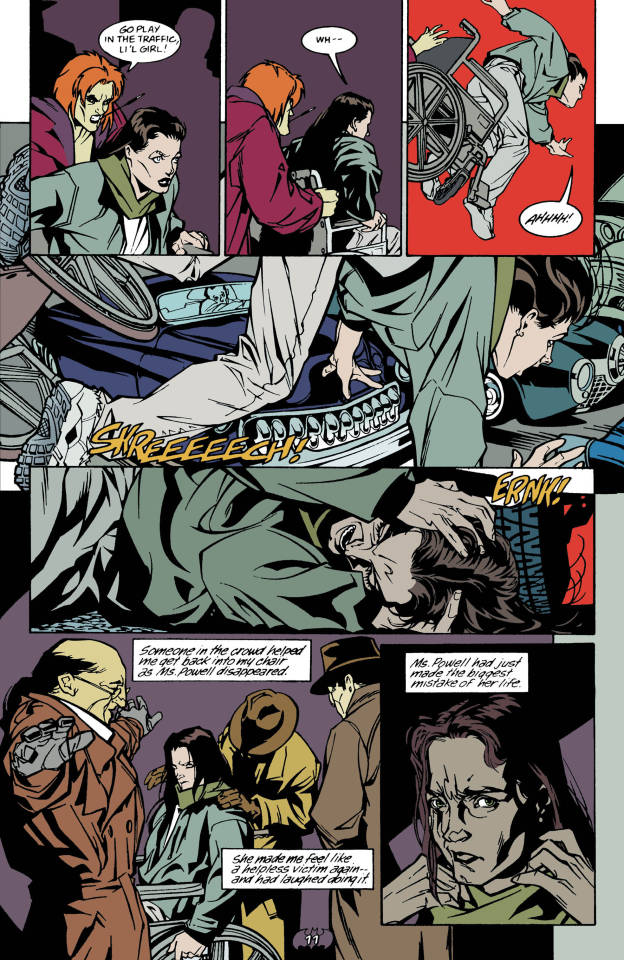
Well, pushes her wheelchair over and makes Barbara nearly get hit by traffic.
Anyway, after getting helped back up and learning some self defence tips, Barbara has a dream.
“You have lost nothing that matters” says the oracle of Delphi. And when Barbara pulls off her mask, the oracle does the same. And it’s her own face underneath.
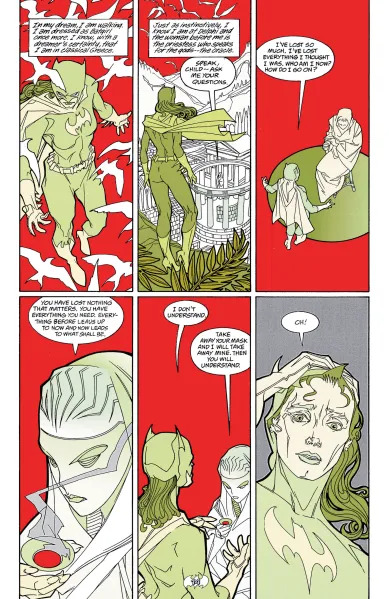
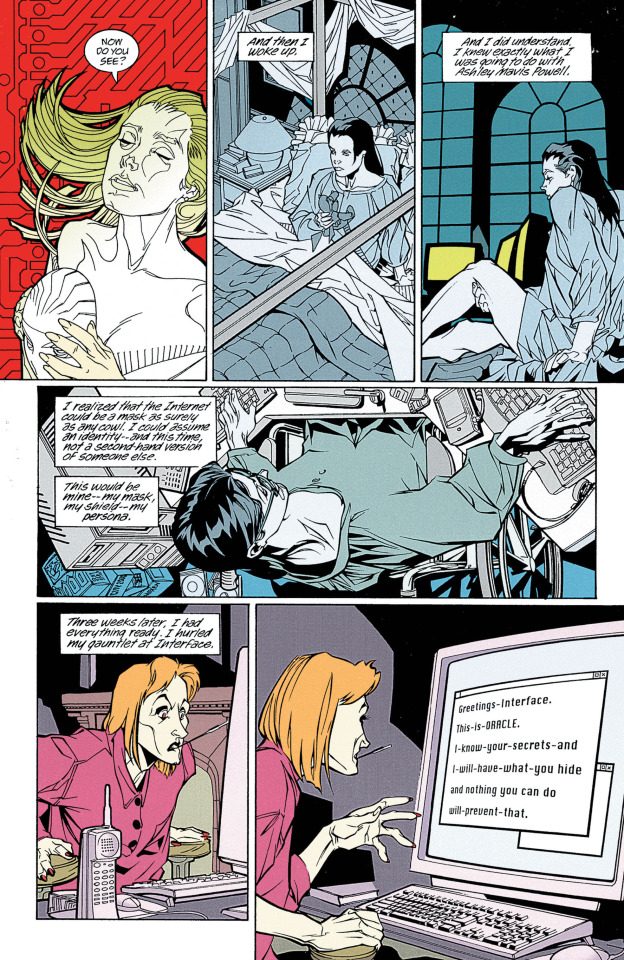
And that’s where it clicks. Joker took away her ability to walk, but she was already a genius with computers beforehand.
So, Barbara commits her first act as Oracle, and the story ends hopefully. The entire story is a metatextual rescue of Barbara Gordon, because the original writers had no plan for her post TKJ. The writers of this one, John Ostrander and Kim Yale, looked at Barbara’s situation and went “Hey, let’s actually explore this.”
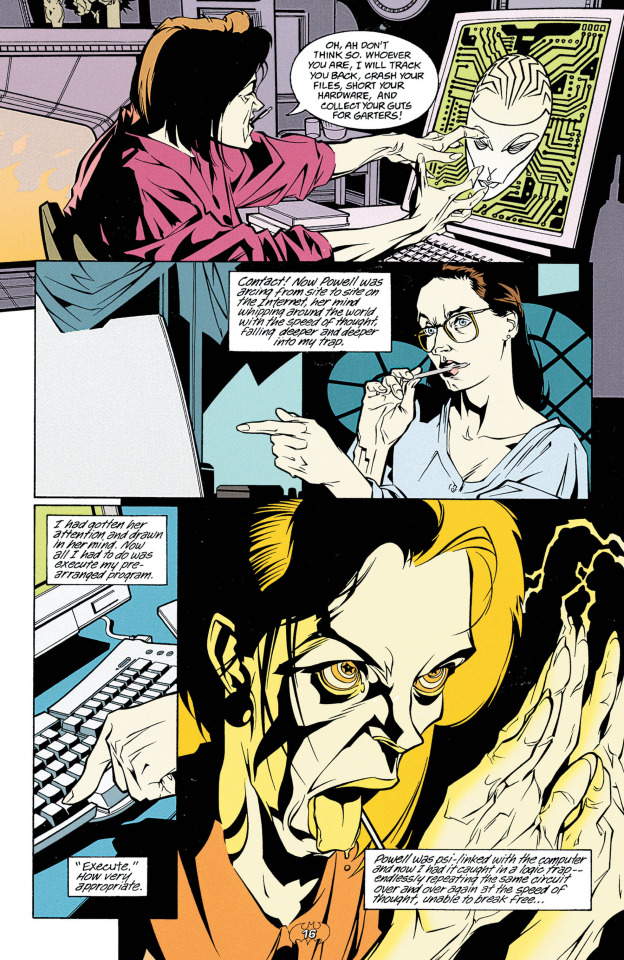
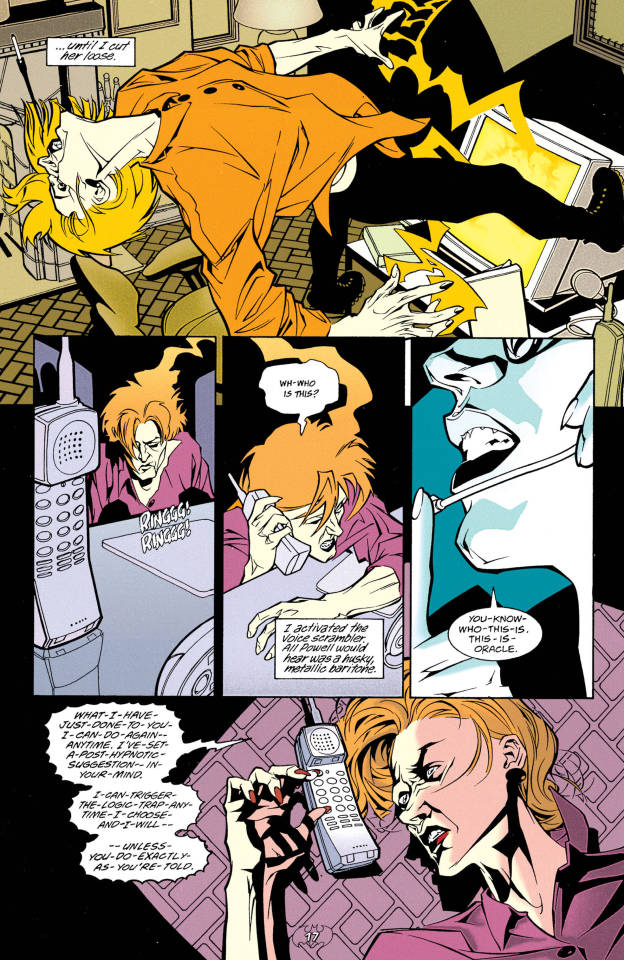
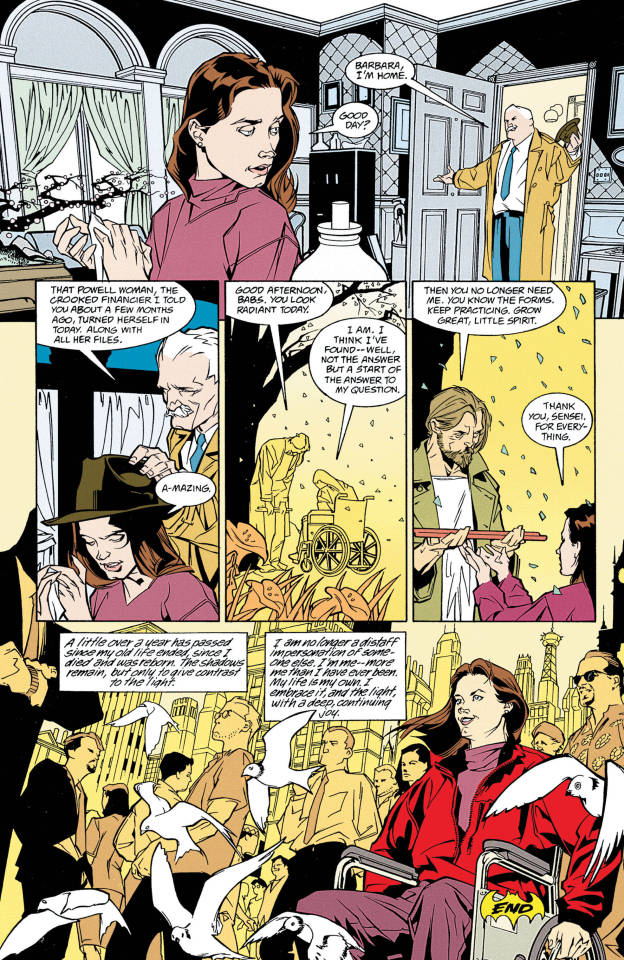
"I am no longer a distaff impersonation of someone else. I'm me-- more me than I ever have been. My life is my own. I embrace it, and the light with a deep, continuing joy."
In part two, we will discuss catharsis.
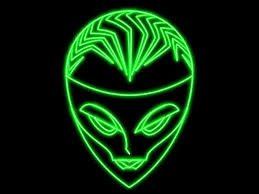
Stay tuned.
24 notes
·
View notes
Text
Air's Bizarre Christmas Rom-Com Reclist
I am a fan of Romance Media, but even more importantly, a fan of mediocre art. As such, I have watched a lot of christmas romcoms. I have in fact watched Too Many christmas romcoms. While freelancing between jobs, I would put them on in the background as mindless noise to keep me company while writing copy.
This means that I am uniquely positioned to create a rec list of christmas rom-coms that meet a very specific set of criteria:
Is the movie interesting enough to make me actually Watch it instead of half-listening to it in the background?
Are elements of the plot bizarre enough to make me yell "WHAT" at the screen?
Would I rewatch the movie in the company of friends?
Any movie that fulfills all three of these criteria is eligible to join those privileged few, the elite ranks of My Christmas Rom-Com Rec List
A Chance for Christmas (2021)
Synopsis: "Influencer Christina Chance gets the opportunity of a lifetime: a lucrative sponsorship from the brand of her dreams. However, she soon discovers she's stuck in a time warp where the same Christmas Eve repeats itself over and over again." Commentary: This is a Tubi original, and it lives up to all the mess that status bestows. That established, my favorite parts of this movie are that the main character and love interest have the same kind of obsessive, perfection-driven marketing brain poison that lead them to try to min-max a time loop and learn zero lessons for the vast majority of the movie. There's a kind of frenetic, self-absorbed energy to each of the characters that's fascinating to watch. At one point the main character attacks a man dressed like Santa in an act of misdirected rage, and the love interest holds her concerned family back while yelling "SHE NEEDS THIS LET HER GO SHE NEEDS THIS". Also, the kids are actual characters with inner lives instead of props! There are structural issues with the movie, and in my perfect world, the protagonist would quit her influencer job, but overall, I enjoyed it.
A Christmas Movie Christmas (2019)
Synopsis: "A Christmas movie fanatic and her cynical sister wake up to find they are now the stars of a Christmas movie." Commentary: I have a soft place in my heart for scripts written by actors who have been trapped in this Christmas purgatory for years. There's a certain sensitivity to The Way Words Work that is nonexistent in most of these films. Especially since this industry relies on Never Retaking Any Line Read Ever because these movies are basically made on an assembly line. That is to say, this movie is a love letter and a list of grievances wrapped together in a metatextual bow. All of its jabs at the genre feel like they come from a place of familiarity rather than scorn, and the actors are obviously having fun. Line deliveries and elements of blocking feel like they have actual character work put into them, and one of the love interests feels like a Christmas Homunculi with no understanding that a world other than snowglobes and sugar cookies exists. But on purpose this time! If he encountered a turtle flipped on its back, he'd start feeding it christmas cookies, and the movie is Very Aware of This. It's fun.
Baby It's Cold Inside (2021)
Synopsis: "When a travel agent up for a promotion is directed to forget her tropical vacation and instead visit the world-famous Ice Hotel, she discovers that her sacrifices are more than compensated." Commentary: I'll be honest. This one is mostly here because the editing choices made me feel like I was losing my mind. I ended up dragging my roommate down to the living room at multiple points so that they could witness the same thing I was seeing. The jarring cuts, dropped story beats, and lines that lead nowhere make for an unforgettable viewing experience... except for the part where I have forgotten literally every other element of the movie. Except for the inexplicably evil love rival who becomes niceys at the end. I like her. Girlboss. This isn't even the only Hallmark movie that was set at and filmed at Hôtel de Glace in 2021. Truly the most Hallmark movie on this list.
Christmas Perfection (2018)
Synopsis: "Darcy's been striving for the perfect Christmas since childhood; thanks to a magical figurine her dream finally comes true." Commentary: I have already written up my thoughts on Christmas Perfection in EXTENSIVE detail here. Needless to say, I watch it every year. What a fascinating text. What an odd timeloop. It should have been gay.
Snowmance (2017)
Synopsis: "Each year Sarah builds her "Snow Beau" snowman with her best friend Nick. After another breakup, she begins to wonder if she'll ever find her own true love. A little Christmas magic brings her Snow Beau to life." Commentary: I cannot believe the snowman actually came to life. The snowman came to life and he's not even the primary love interest. Nick sucks in a normal possessive childhood friend love interest way, fuck Nick, everyone hates Nick, sure, but THE SNOWMAN CAME TO LIFE? THE SNOWMAN CAME TO LIFE AND HE TRIES TO SELL THE PROTAGONIST'S HOUSE!!!!! SHE LIVES THERE!!!!! This movie made me scream out loud multiple times. It is not good. Please watch it.
Timeless Love (2019)
Synopsis: "Megan wakes up from a coma in a hospital. The husband and 2 kids she just dreamed about aren't real. At her first job interview, she meets Thomas from her dream - or was it a vision years into the future?" Commentary: Listen to me. Listen. The establishing scenes of this movie are played completely straight. For the first chunk of the movie, it feels like this is going to be a dramatic, serious movie in a way that Hallmark Christmas Romcoms fundamentally are not, which makes it EVEN WEIRDER when it suddenly pivots into your classic nonsense. It entrances me. Who let this happen? Why is the medical professional who is assigned to help Megan with the trauma of losing her coma-construct family and recover from being in a literal coma cartoonishly evil? Why was the information Megan obtained from the coma dream accurate to real life? Why is she suddenly okay with losing her coma children as soon as she found the real-world version of her coma-husband? What a fascinating text. I have no clue what to do with it. But maybe you do. I'm folding it into your hands. Whatever happens next is your decision
#rec list#christmas#christmas ment#i didn't put the netflix movies on here everyone knows about those and they're trying too hard to be weird#where's the naive camp i ask you
88 notes
·
View notes
Text
so one interesting aspect about Metro Man kind of concerns his relation to the specific vibe of the Superman Parody archetype; the persona.
This is less specific to Superman himself (though it can be something he addresses now and then, and its often about the distinction between the way he acts as Clark Kent vs the way he acts while acting as Superman), than it is to his imitators, legally distinct equivalents, negative depictions that often voice the opinion that a Superman could never be actually heroic or noble, and sincere tributes or reflections to everything good about Superman.
It's a core aspect of, say, Homelander's character and what makes him evil. Its a core aspect of Omniman and his deep internal conflict about his culture's brutal attitudes vs him genuinely becoming that character and trying to convince himself otherwise. It's become an era-specific aspect of Aberrant's Caestus Pax (and may in turn reflect the changing attitudes of superheroes in a metatextual context), and it is perhaps the single most prominent thing about All Might in his relationship to Superman as a character, and it amount to this thing:
The Superman Icon and persona, and how they're seen in-universe.
Let's go back to Caestus Pax a bit. In the tabletop RPG of Aberrant, he is considered the most powerful nova (superhuman) in the world, leader of super team equivalent Team Tomorrow, and a popular hero. He's a background character for the most part, but an important one. The original Aberrant was a mystery-focused deconstructionist that was somewhat hostile to a lot of general conventions of superhero genre that only gradually went away, being heavily inspired by the likes of The Authority and its imitators. Pax reflected this, seen as an ultimate hero and paragon; in private, however, he is absolutely obsessed with his image, fixated on publicity and his image above all else, to the point that his skin was becoming plastic just like his own toys. He's even stated to care about a fight because it could prove that he's the strongest guy, which would solidify his rating.
(That said, he's not a villain in a conventional sense; he's obsessed with his image, but he's a fairly decent guy otherwise.)
The second edition, which is a lot more sincere about superheroics (reflecting the changes in perception over time; deconstructions have come and gone, and its just not that interesting to focus on that) reworks him considerably, making him a humble blue collar guy who is kind, friendly and wound up as the world's strongest hero, but ultimately still thinks he needs to be stronger to save people, haunted by the deaths of his family (who died in the same accident that awoke his powers, and even with his strength he couldn't save them). And this ties into the Superman Persona.
Here's what I mean by that; Superman acts a certain way. Sometimes he's a goofball as Clark Kent, and as Superman he is much more imposing; rarely threatening, but always affable, and above all else inspiring. Superman is everyone's friend, and he might be friendly, or he might be patient and have big Just Some Guy energies, but above everything, Superman is usually acting like that on purpose to chill things out. People respect him, and the way superman is perceived as an icon of the age is a big part of any character drawing on the same premise, with a meta aspect; Superman's role as the First And Best superhero is so integral to him, characters based on him must reflect this in some way.
So here's where Metro Man comes in.
Metro Man is fundamentally a guy who became Superman because he fits the marks; he's an alien who survived his home world with fantastic powers, beloved by all because he's good at playing to the crowd. We don't really get much of him early on, making him a mildly bullying suck-up who gets into a big hammy fight with Megamind that feels like a performance (because it IS), and mostly he exists as a Superman equivalent. When he turns out to still be alive, we see that he's profoundly unhappy as a hero, and fundamentally exhausted of a role he honestly never really wanted to do, but only did it because it was expected of him, for precisely the same reasons that Megamind became a villain. (It's also all but stated that he fully believes Megamind is the one who can be a real hero and he's trying to encourage him to do that, but that's another topic.)
So this is the point that's made here; Metro Man's persona matches the general aspect of a character who is being a Superman stand-in, but its usually a persona, playing to the crowd and acting like the big hero who inspires others. Metro Man is MUCH more of a performer with a distinct rock star vibe (as his costume designs also indicate); he is genuinely having a blast doing that, engaging with people and having fun, notably only getting tired of it when actual superhero stuff has to happen.
The relevant point is this: Metro Man DOESN'T have a persona. As we see in his dialogue with Megamind when he retires, and in his final scene as he shows pride in Megamind becoming a full fledged superhero in his own right, he acts exactly the same as he does when he's acting in-character. He does not put on a dorky attitude OR act more bombastic, he acts pretty much the same in private or not.
He's always a performer, playing to the crowd, because that's what he actually loves doing; the physical and action stuff is something he doesn't care for, and he is incredibly efficient at it. This probably indicates his experience, but it might also imply he just wants to get it over with ASAP, and it stands out compared to his more flamboyant attitude when he's zooming around, high-fiving crowds and so on.
He doesn't really cultivate a public/private persona distinction, downplaying his actual feelings to suit his persona (more common among evil Superman copies) or acting the part of the hero people expect him to be to give them hope and reassurance (a lot of takes of Superman himself and those similar to him, like All Might). It's literally just the way he normally acts.
18 notes
·
View notes
Text
There's something so satisfying about seeing a movie by filmmakers who know exactly what they're working with. Watching film that's groundbreaking and new and interesting is absolutely wonderful, don't get me wrong. However, watching something play out and slowly realizing that the crew knows all the ins and outs of the genre they're working in, seeing a team that's composed of people doing their job well and crafting a satisfying story without pretension - especially when I wasn't expecting anything remotely competent - is a cozy delight.
I know I've dragged out the dead horse of Cabin In The Woods multiple times for beating, but it's such a great example I need to bring it up again, because it so clearly has no concept of working in the horror genre, and doesn't understand the slasher subgenre at all. Meanwhile, the absurdly named Massacre Academy, with a deceptively bland concept of "clown mask killer returns for revenge" does not just understand every single part of horror and the slasher subgenre, it actively uses all of them against the audience expectations. While it's not completely free from every common genre flaw, it handles itself shockingly well for an obviously low budget exploitation film.
Out of the gate, it lets you know it plans to be a little silly, sets you up with expectations of only moderate realism. It's a film that is committed to the bit, and the bit is slasher cliches. However, woven through the metahorror humor is also a relatively unusual concept - the sequel to a movie which does not exist. This concept is what really puts meat on the bone, as it creates a smart mix of characters who have PTSD from the prior events, people who are smart about slashers in an in-universe way, and new characters who won't be as aware of the dangers at first. It's choice about the slashers' lives are probably the weakest element (typical "psycho killer" cliche), but it builds the sense of history throughout that I almost find myself believing "part 1" must exist (it doesn't).
There is no evocative, soulful acting or breathtaking cinematography, or complex metatextual story telling - this movie aims squarely at "believable enough to work" and successfully focuses on delivering a smart and interesting plot on that level. What this means is that once it gets rolling it starts serving up all of the types of characters you'd expect to see die violently during the film, turn the expectation completely around, and punch it in the face in a way that had me actually laughing with delight. And knowing how much it was playing with slasher tropes also ended up keeping me effectively in suspense the entire movie.
Is Massacre Academy a brilliant must see movie? Hardly, but it's good, and fun, and it makes me want to keep an eye out for whatever director Mark Cantu has in store for the future.
53 notes
·
View notes
Text
I watched the Scott Pilgrim anime! I was deeply ambivalent, which I am sure is a shock to no one who knows me and saw it lol. I think I have a sequence of thoughts, so I will tackle the obvious one first to get it out of the way: Marketing, Adaptation, & Genre Drift in Scott Pilgrim Takes Off
Starting from top, if you don’t know, the Scott Pilgrim anime is not an adaptation of the original source material, but an alternate history version of the events where the titular Scott isn’t present for the majority of the episodes and Ramona Flowers is the main character. Which has been controversial! Not…amazingly controversial or anything, this is an extremely low stakes scenario and from my analysis the majority of people liked it. But controversial enough to get insufferable Kotaku articles “explaining the backlash” which don’t explain the backlash well. Let me see if I can do a better job - its fun to set low bars for yourself to clear after all.
The backlash starts with the marketing; really just the professional drama-trolls would have objected beyond an initial reaction to Netflix announcing Ramona Flowers vs the World; as a concept it makes a ton of sense, and it is essentially what they actually did (well, we will get into that). But that is not how it was sold:
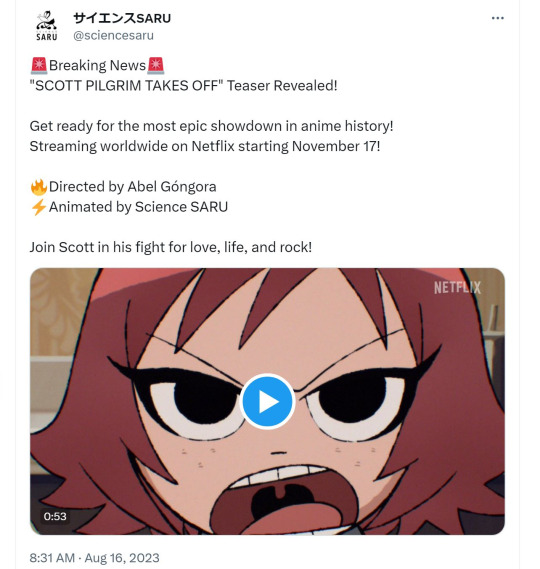
“Join Scott in his fight for love, life, and rock!” I’d love to, still waiting for the invite! This is the first teaser for the show, and if you do a quick “frame count” it pretty equally privileges Scott & Ramona both, but Scott is still on top and it deliberately hides any sense that it is an alternate timeline. It even has this screenshot as one of its final moments:
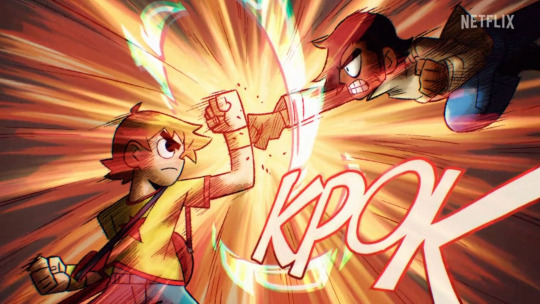
Which I am pretty sure does not appear in the actual anime! If it does its in some flashback alt-timeline scene in a later episode, not its implied context (in the actual episode Scott ‘loses’ this fight). I can show more evidence - casting the original cast of the movie to make it seem like a ‘recreation’, statements by O’Malley where he plays deliberately coy with the idea of how similar it's going to be, and so on - but I think I don’t have to, because it was intentional, you don’t have to read the tea leaves on this. The bait-and-switch is part of the marketing, not an accident from it.
That is the step 1: people are thrown about being deceived. The step 2 is simple - this is a deception about an adaptation. I am someone who constantly complains about shows sacrificing cohesion & storytelling for “the twist”, but its too common these days to be that mad over it in a mass way. My designated punching bag over at Kotaku points this out:
This is a recurring theme for metatextual work like Final Fantasy VII Remake and the Rebuild of Evangelion films: initially they’re presented as retellings of beloved stories, only for it to become clear at some later point that they’re going to take more than a few liberties and tell a different story entirely.
The difference here is that FFVII and Evangelion are remakes, not adaptations. FFVII is a video game being made into a video game again; Evangelion is a tv show + movie being made into a movie series. The FFVII decision was controversial, but fundamentally you can just go back and play the original game; fucking everyone hated the idea of the Evangelion rebuilds being remakes because that is pointless, the originals have aged amazingly, and they had to deviate to justify their existence (they failed at that, but a story for another time). Meanwhile, Scott Pilgrim is a comic, that has never been a TV series, or an anime. There is the movie, but did you know a bunch of comic fans hate the movie? You see a lot of comments like these all the time (from a discourse reddit thread debating the new show):
Personally, I thought it was fun. I agree with a lot of your complaints honestly, but I don’t understand how you liked the movie? I can’t stand the movie because I feel like the characters are all flat, especially Ramona who has absolutely no personality at all.
I disagree btw, the movie is great, but it is a loose adaptation - hell it was released before the final volume of the graphic novels was finished, it has a different ending! A short, cohesive movie could never adapt a long-form, episodic graphic novel. And its live action, stylistically very different. So this TV show was both branded as, and was expected to fulfill a demand for, a first “real” adaptation of the comic, that people wanted. The fact that Evangelion deviated in its remake is a poor comparison. Questioning that people want full adaptations of works they enjoy isn’t really worth our time.
Now I personally don’t care about the above two - I am explaining the debate, but they aren’t problems for me. Step 3 is where I start caring - I think Ramona Flowers vs the World is a great idea. They thought they made that, and I wish they had. But in the process of telling the bait-and-switch of the story, they also bait-and-switched the genre. There is this great quote from O’Malley about the original graphic novel’s story from an interview (whose headline we will revisit in another post, don’t you worry):
Yeah, I mean, when I was writing Scott Pilgrim the first time, I just wanted to come up with a very simple story engine: fight, fight, fight, get to the end. That gave me something to hang all this other stuff on, all this slice of life hanging out in Toronto.
Its such a nice summation of what Scott Pilgrim is - the fighting against the evil exes? Its all sizzle and jokes, none of it matters. Its a plot device to structure the real story, which is a slice-of-life romance drama, coming-of-age narrative, and extremely intimate portrait of Toronto’s scene of indie music venues and hipster coffee shops. The joke is that Scott is dealing with all this crazy video game/anime shenanigans on top of actually having to navigate very grounded past emotional damage and present challenges of adulthood. The heart of the comic is not the fight scenes, some of which literally happen in the background while other characters are talking, but scenes of a group of friends hanging out at 11:00 PM at a dive Korean restaurant:

Scott Pilgrim Takes Off meanwhile is not built around this cast. Its built around a mystery plot and Ramona Flower’s evil exes, who she is investigating, and Scott Pilgrim, uh, checks notes travelling to the future and fighting his …aged enraged alternate self from the original timeline…? Anyway, Ramona’s evil exes are mainly joke characters, comic reliefs who engage in crazy shenanigans. Half of the episodes are structured around them, and their episodes are filled with extended comedy bits and very-long fight scenes. Episode two has a 13 minutes long fight scene between two of them, including build-up, over control of the League of Evil Exes. Hell, they don’t even live in Toronto - a ton of the new anime takes place in New York City and a bit in California. The comic meanwhile has panels just…explaining locations in Toronto sometimes:
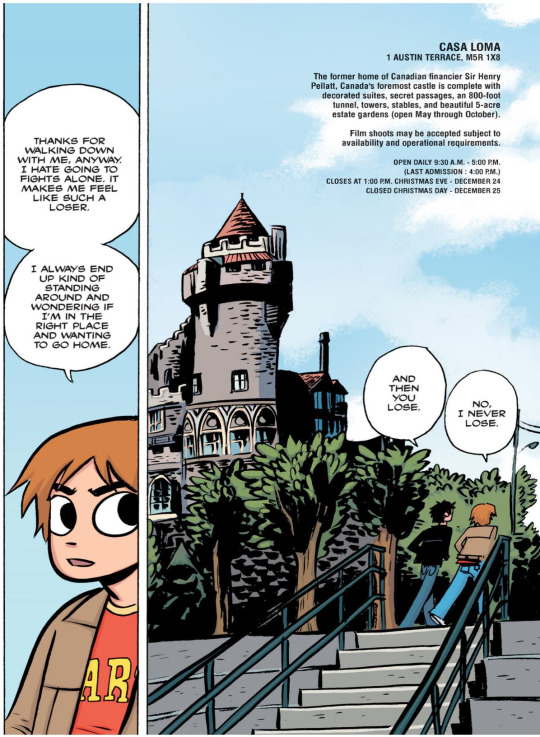
Listing the hours of operation, its so cute! The anime has no time for this in between its sci-fi plots and fight scenes, and its far cheaper for it.
The decision to focus on shallow characters like Ramona’s exes is downstream of the decision to focus on Ramona without Scott -besides the exes the rest of the characters are Scott’s friends, who Ramona gets to know through him. Which is the final point here - who are the characters people love from Scott Pilgrim?
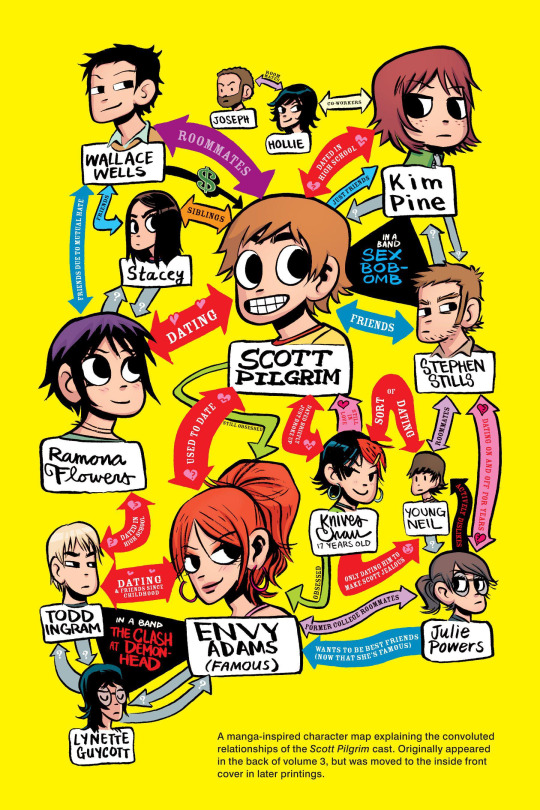
All of Scott’s friends ofc. Characters like Lucas Lee are memes, not people. Obviously Kim Pine, Young Neil, Knives Chau and so on appear in the anime. Sometimes they have great scenes - like the adorable scene of Knives & Kim playing music together, Knives’s first time really trying to jam:
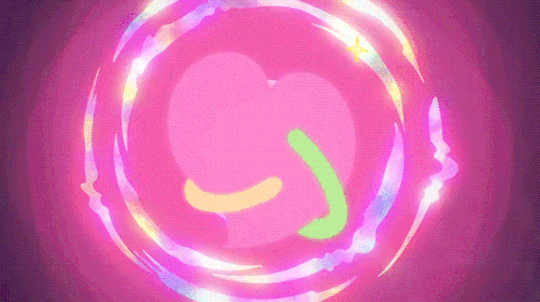
Which goes absolutely nowhere from a character perspective - Knives & Kim barely interact after this. It sets up Knives doing a comedy-meta musical for the plot, sure…but that’s boring in comparison to real emotional connections, Knives doesn't have an arc. But they can’t have more, because our main character Ramona Flowers doesn’t know these people; she wouldn’t just hang out with them, and she is busy with her mystery investigation. She sees them when she needs them for plot reasons. Kim and Knives and Stephen Stills are much flatter this time around (Julie, to her credit, kicks ass in this one).
Obviously I could point out that Scott & Ramona’s relationship in the anime, given that they have literally one date before Scott vanishes, has no depth to it, but that is easy. The funniest way to summarize this character issue is if you check the tags on Tumblr right now, you are going to be awash in Scott/Wallace shipping posts. Like I swear, at times its straight(?)-up 50% of the posts going on, its a rabid gay horde out there lusting for this sugar daddy/baby dynamic. Which makes sense, they have so much sexual tension & emotional depth as friends…in the comic. In the anime they barely know each other! Wallace hates Scott and interacts with him maybe a half dozen times, primarily to tell him to move out, then does his own shit. This is all people projecting comic!Scott/Wallace onto the current show.
There are more downstream consequences of these decisions & other issues (like the overdone meta elements, or abandoning most of the indie-music aesthetic) but this has gone on long enough. The point is that telling a different version of the story would actually be fine. It would disappoint some fans, sure, but if done well you would likely win them around. Hell, the original comic’s ending kind of sucks, good time to polish some things. But if you change the main character and the genre and the cast focus and all the character dynamics…at a certain point its just its own new story now. A story irrevocably tied to the old one, but not about any of the things the old one cared about. I think you can see why that would be a harder sell than Ramona Flowers vs the World, even if it was a good zany action comedy anime in its own right. You will get backlash from this level of drift - and you will deserve it.
Also fuck Lisa am I right? Jeez, 0 out of 2 for moving picture adaptations. What you get for being blonde I guess.
72 notes
·
View notes